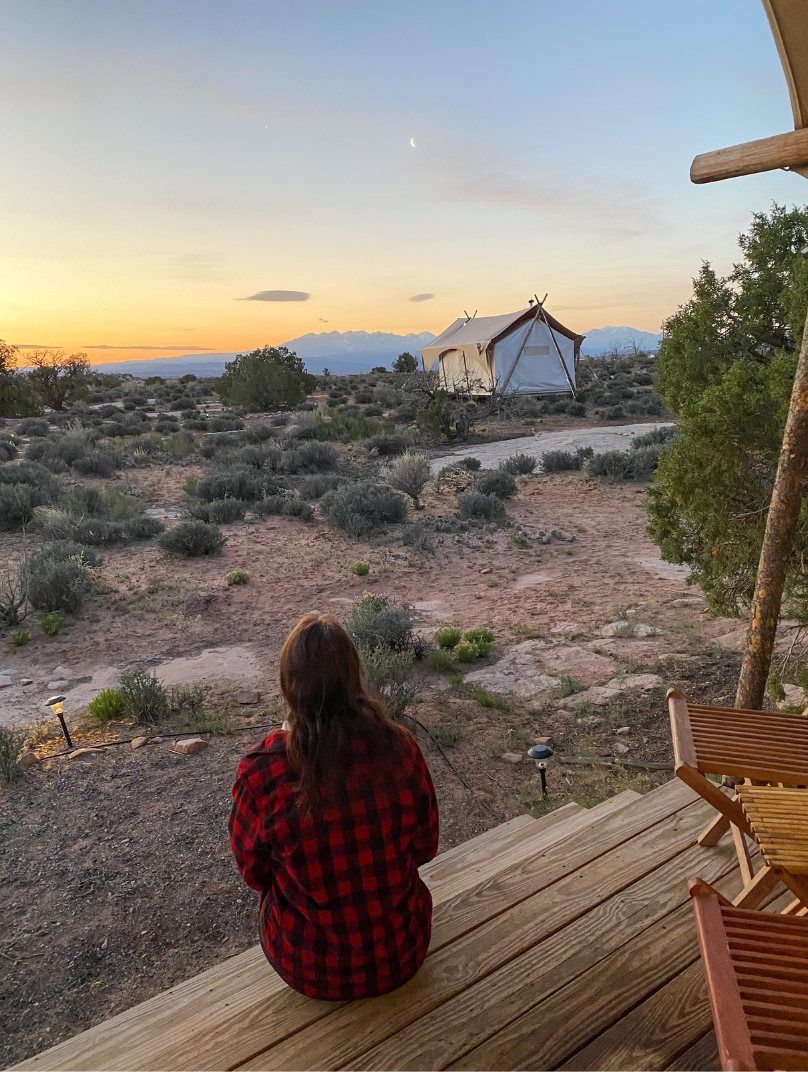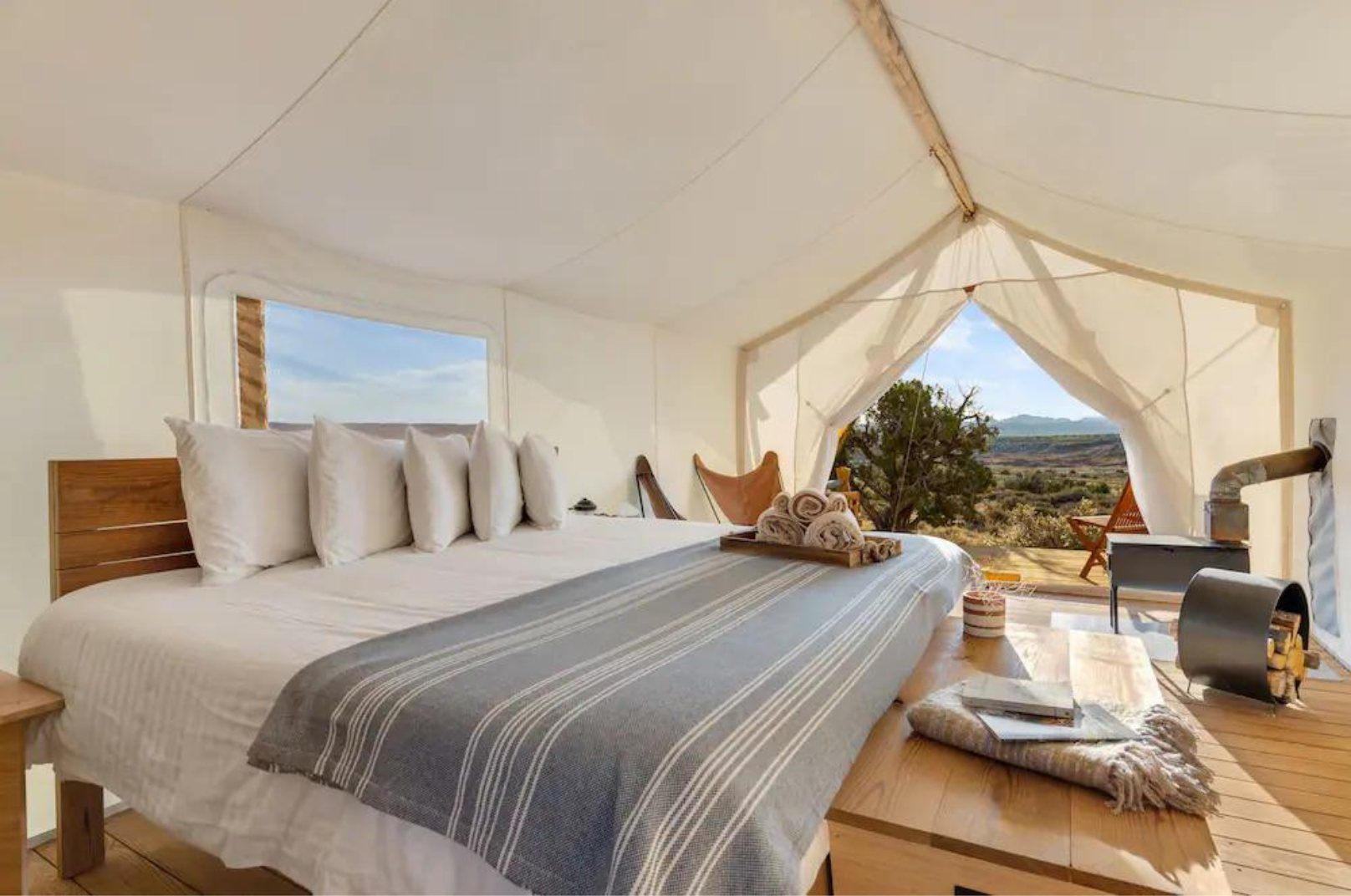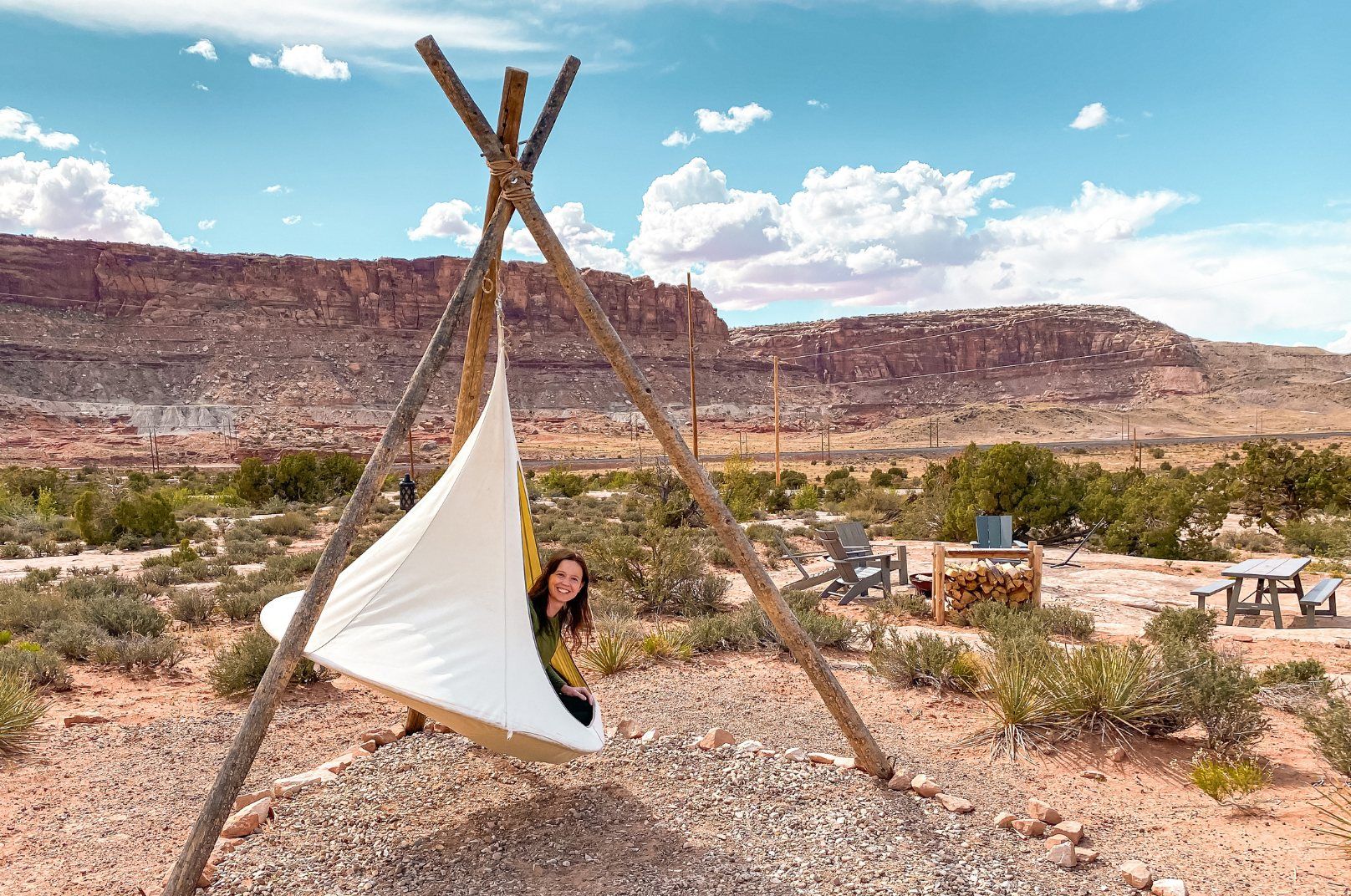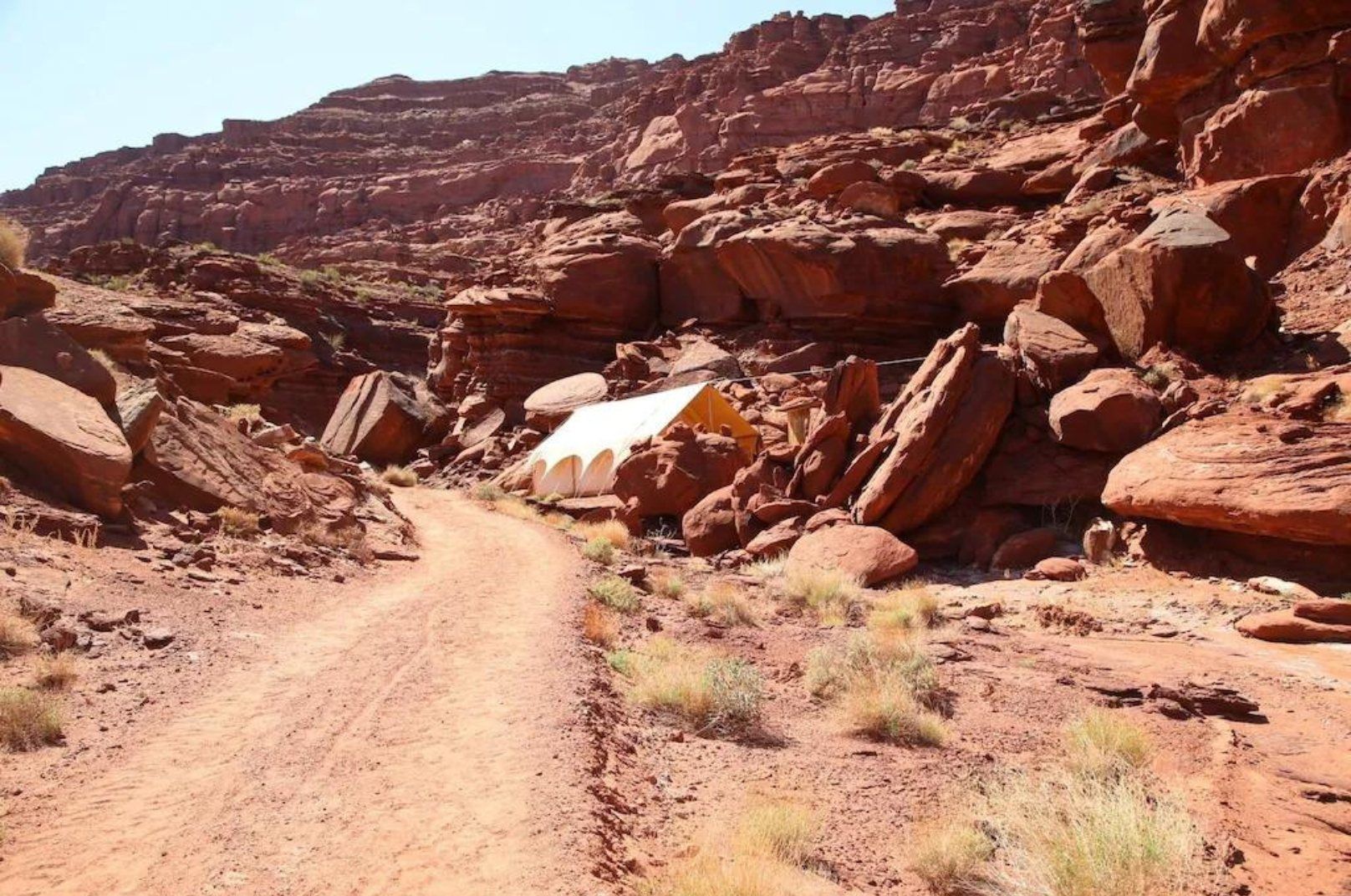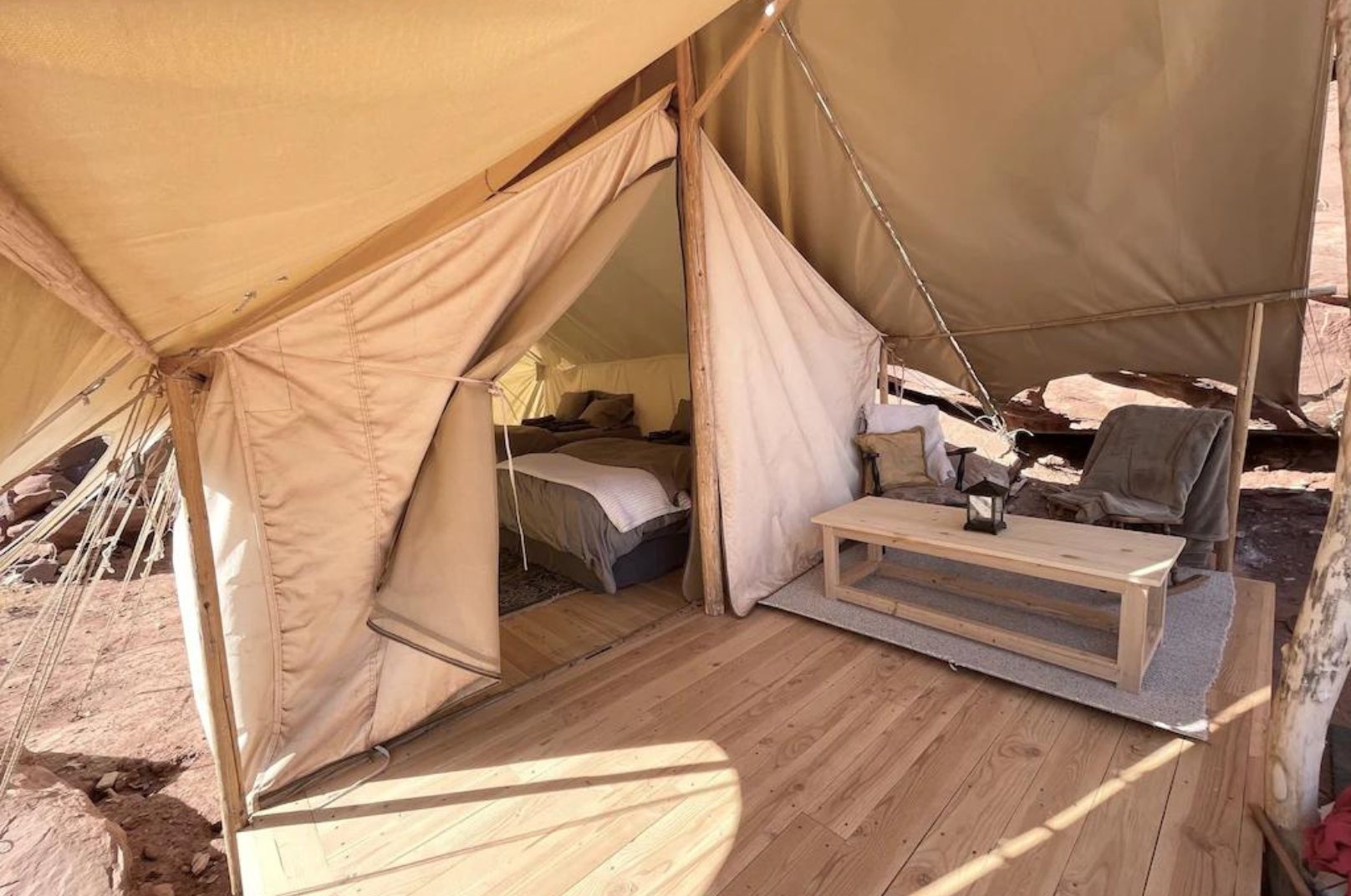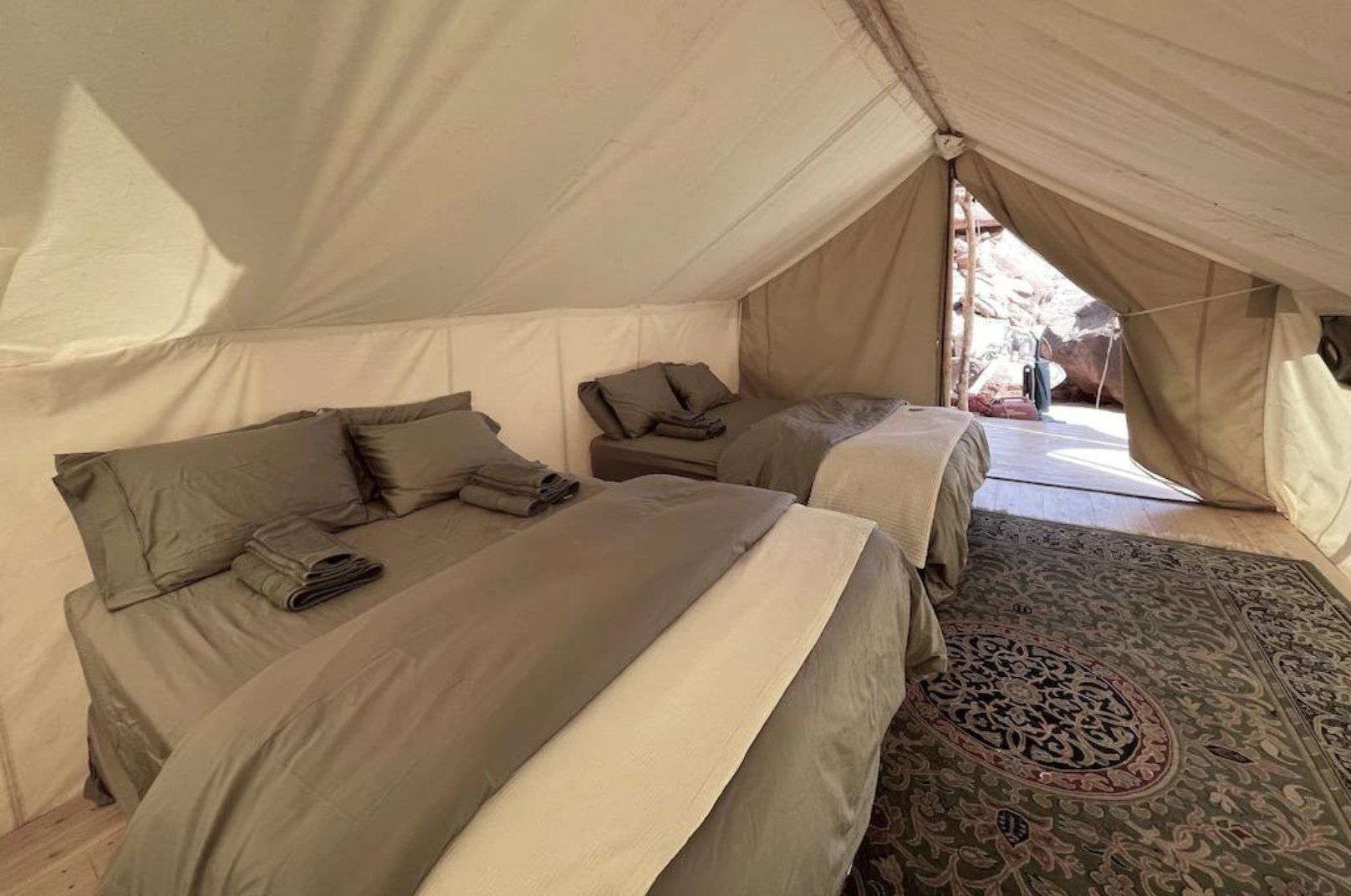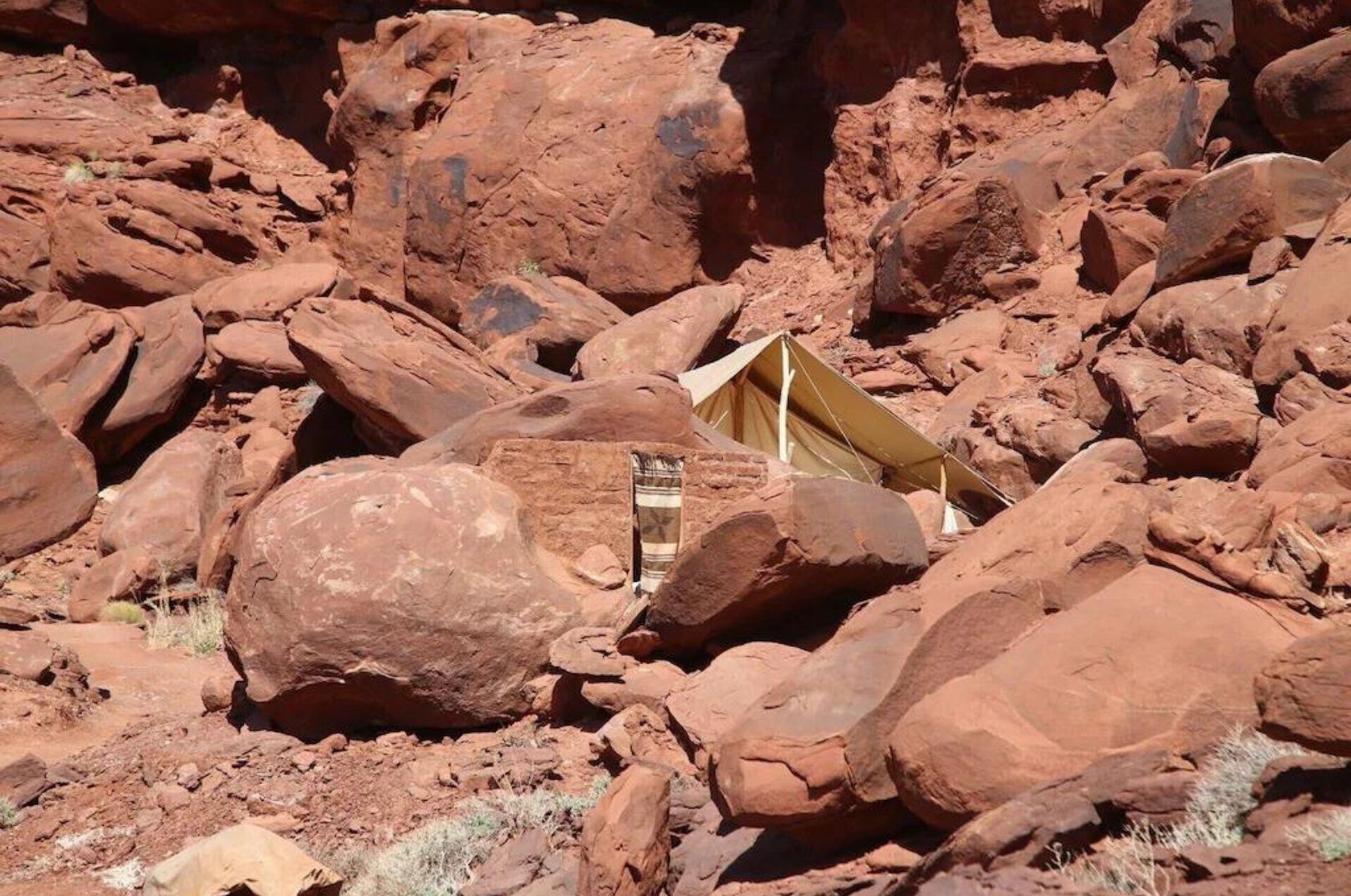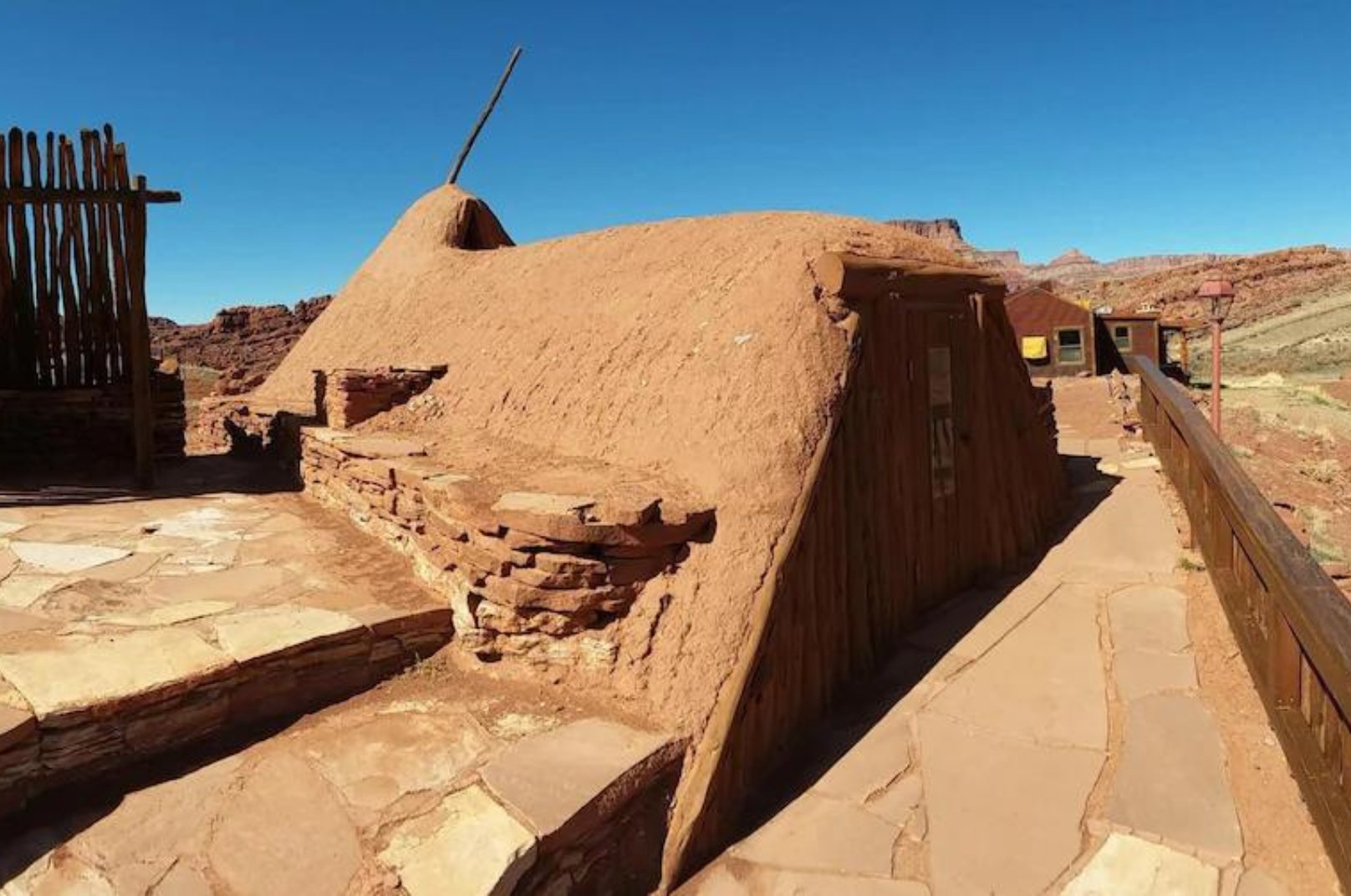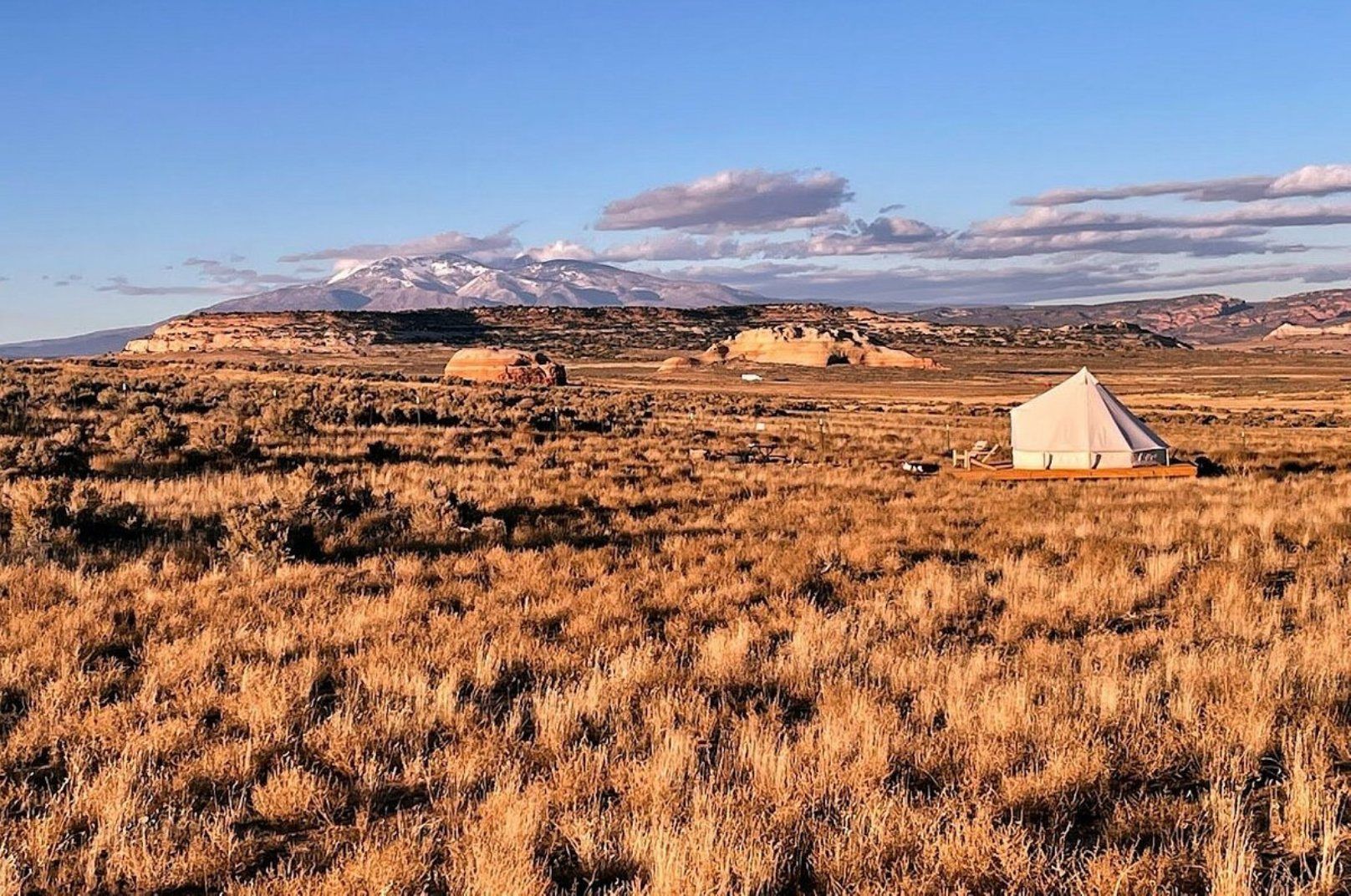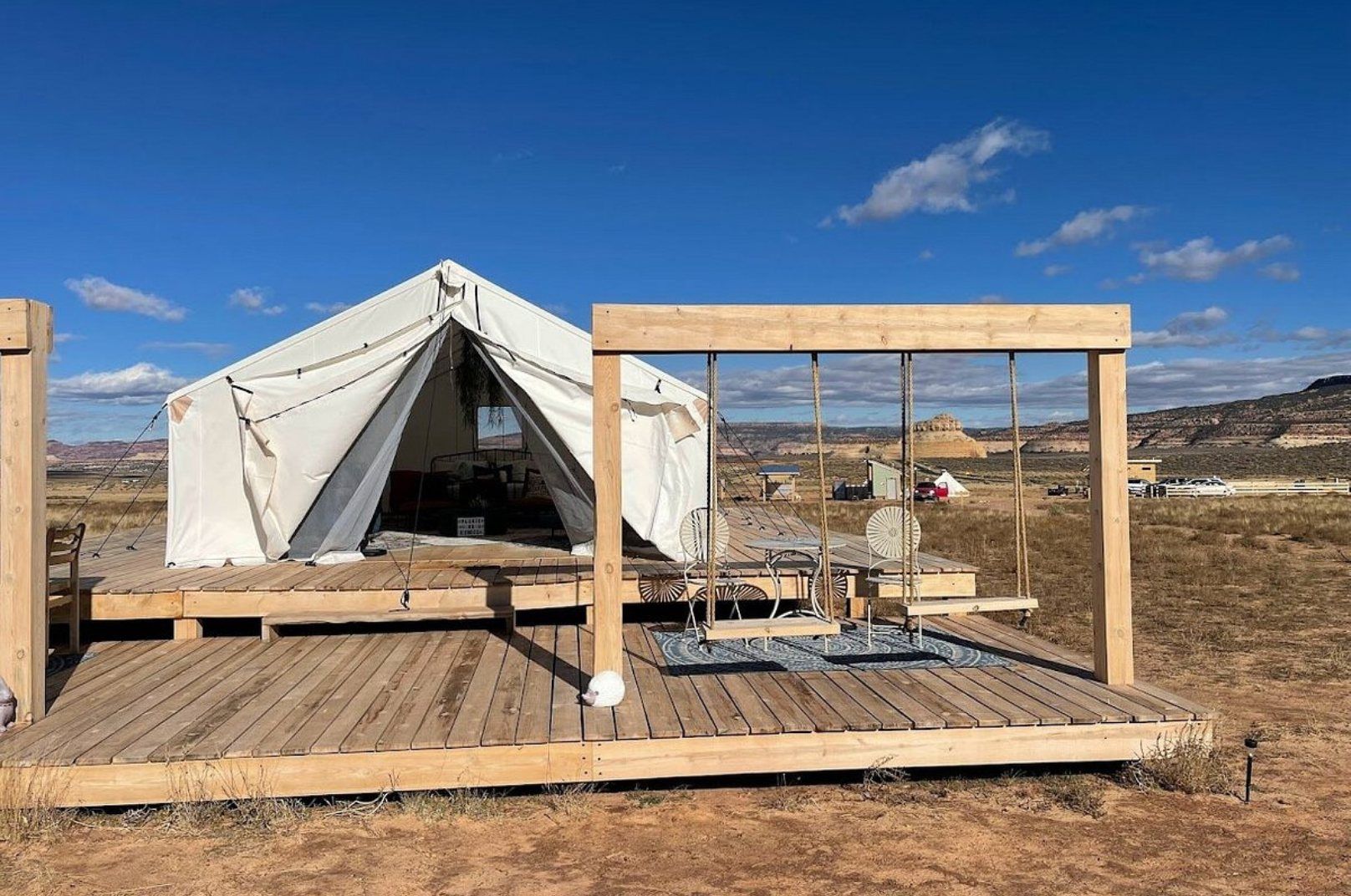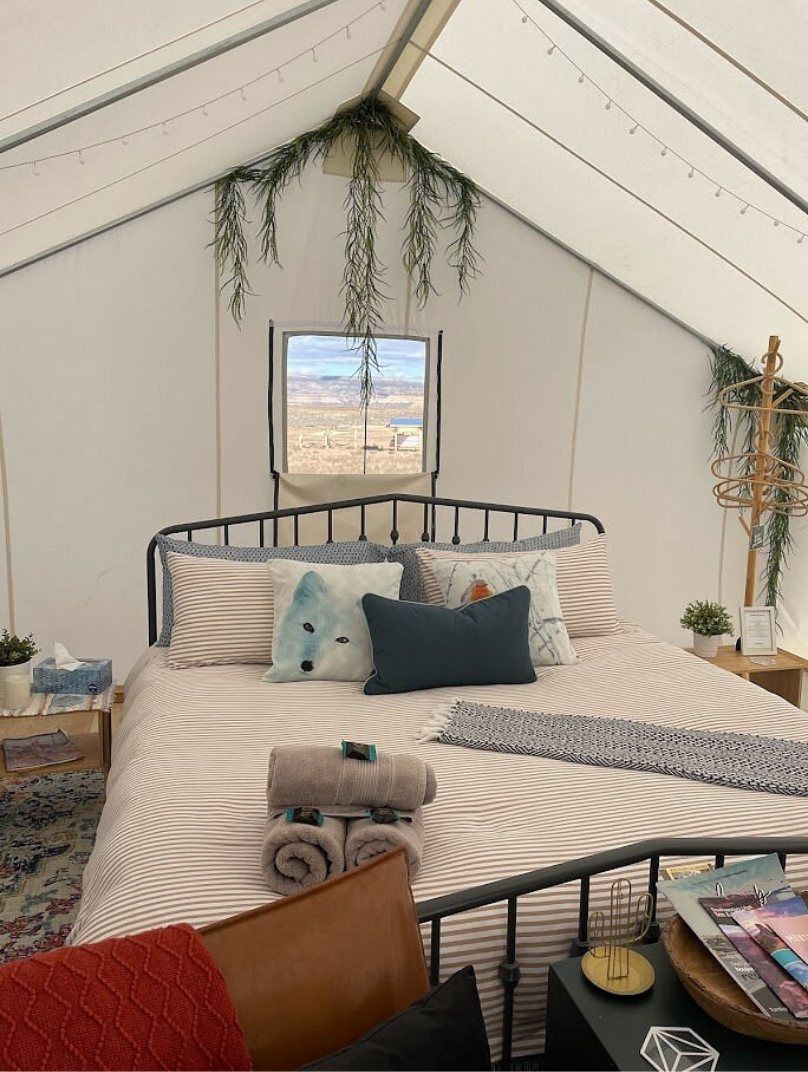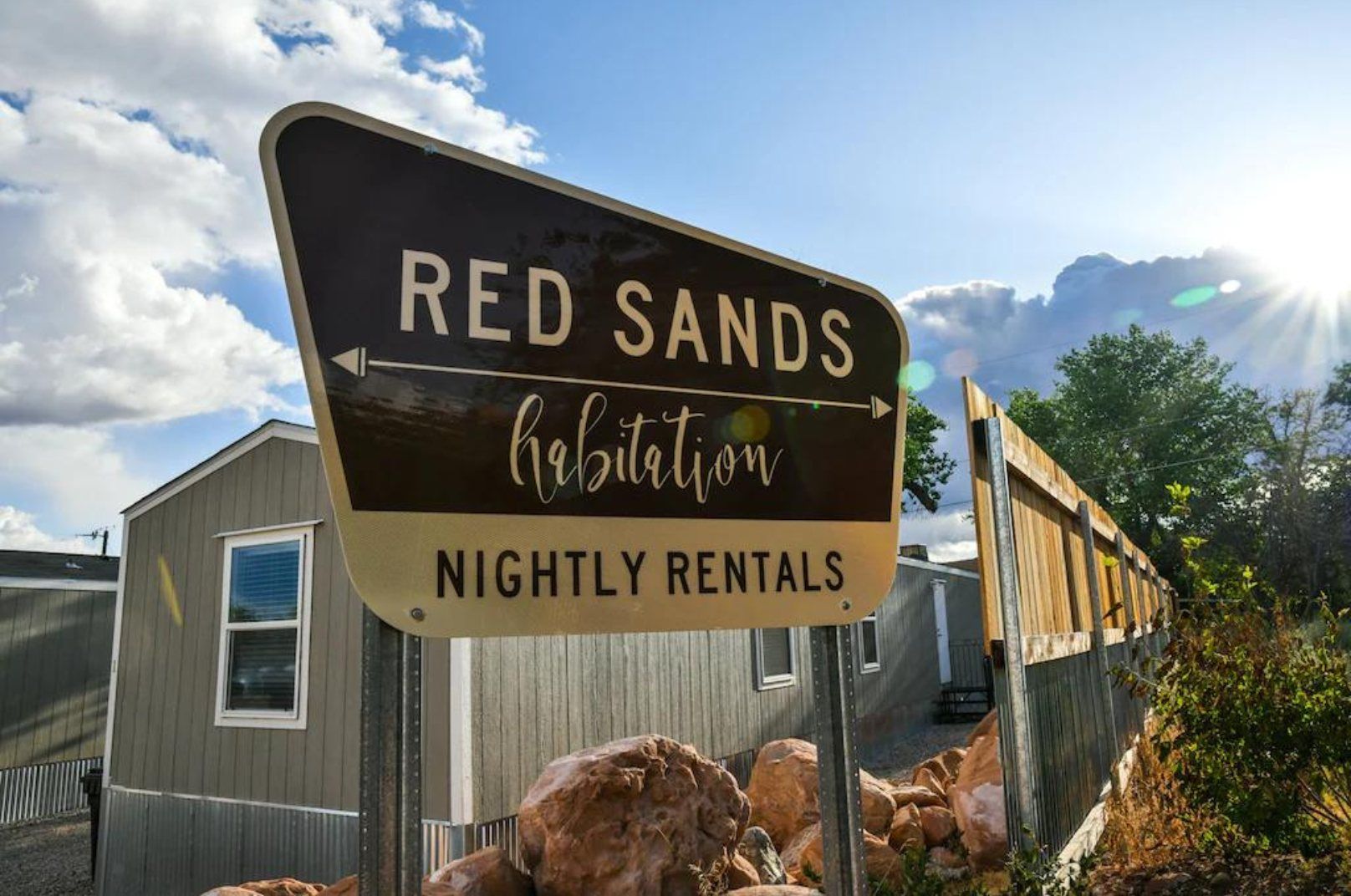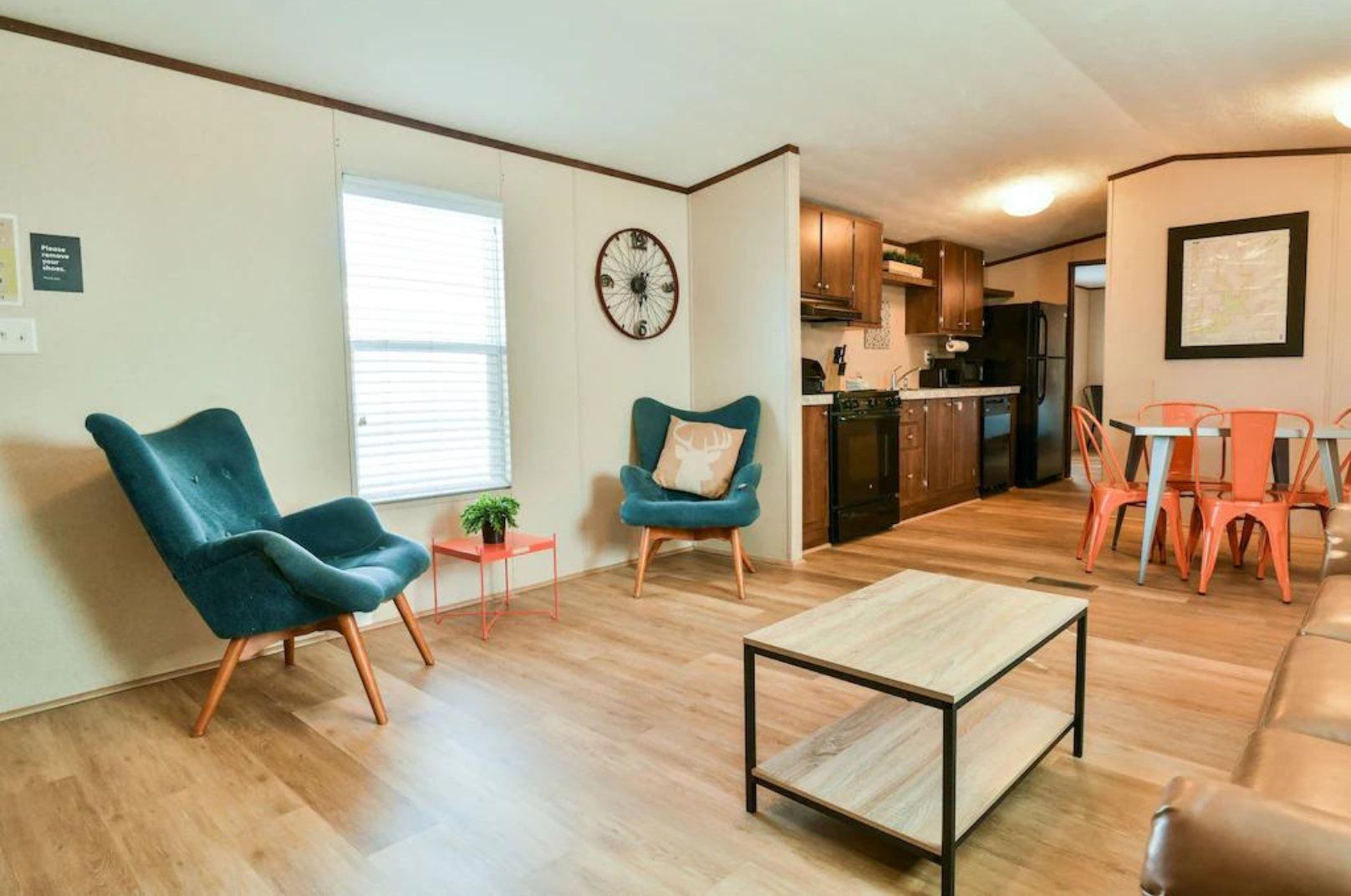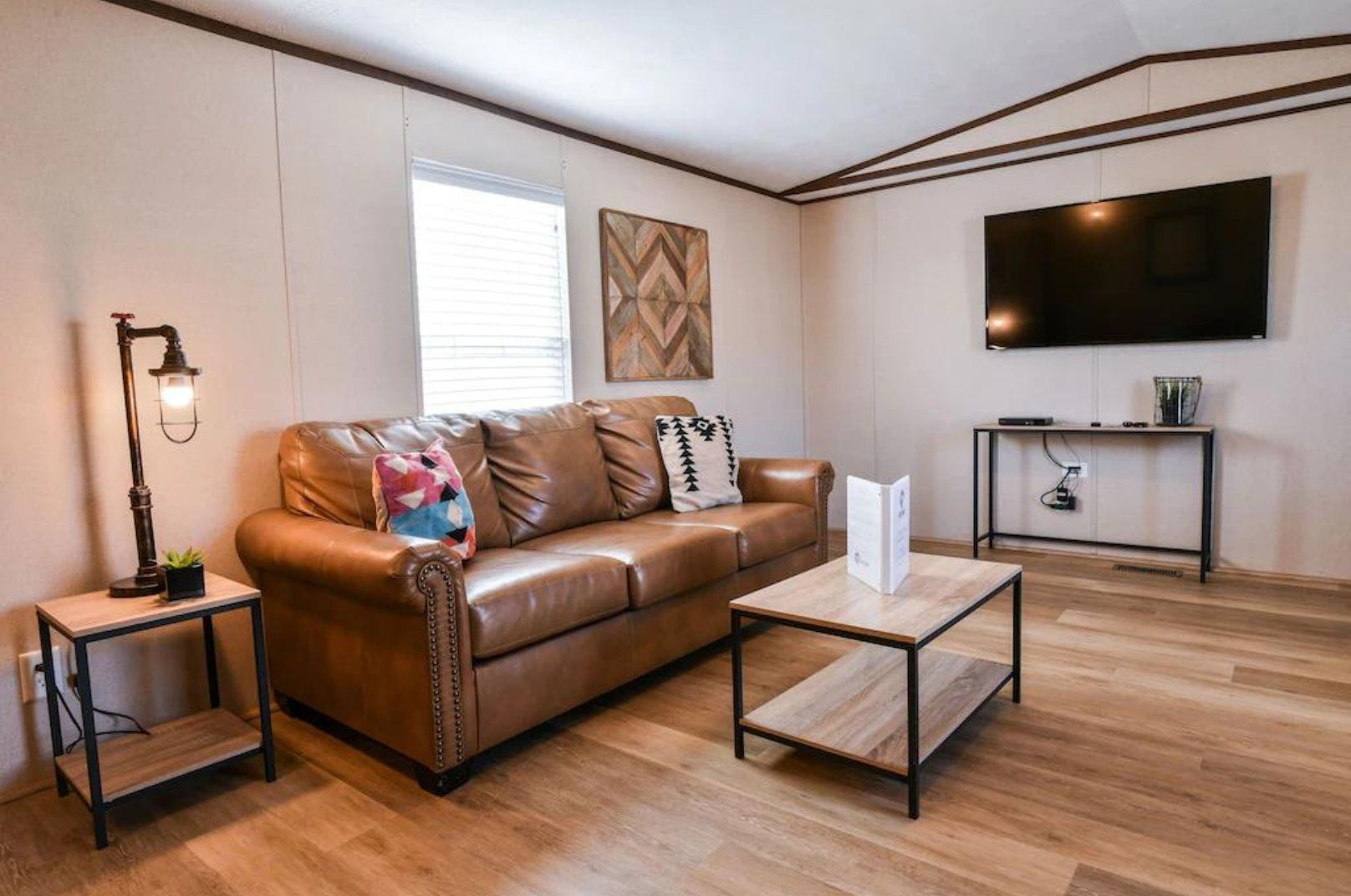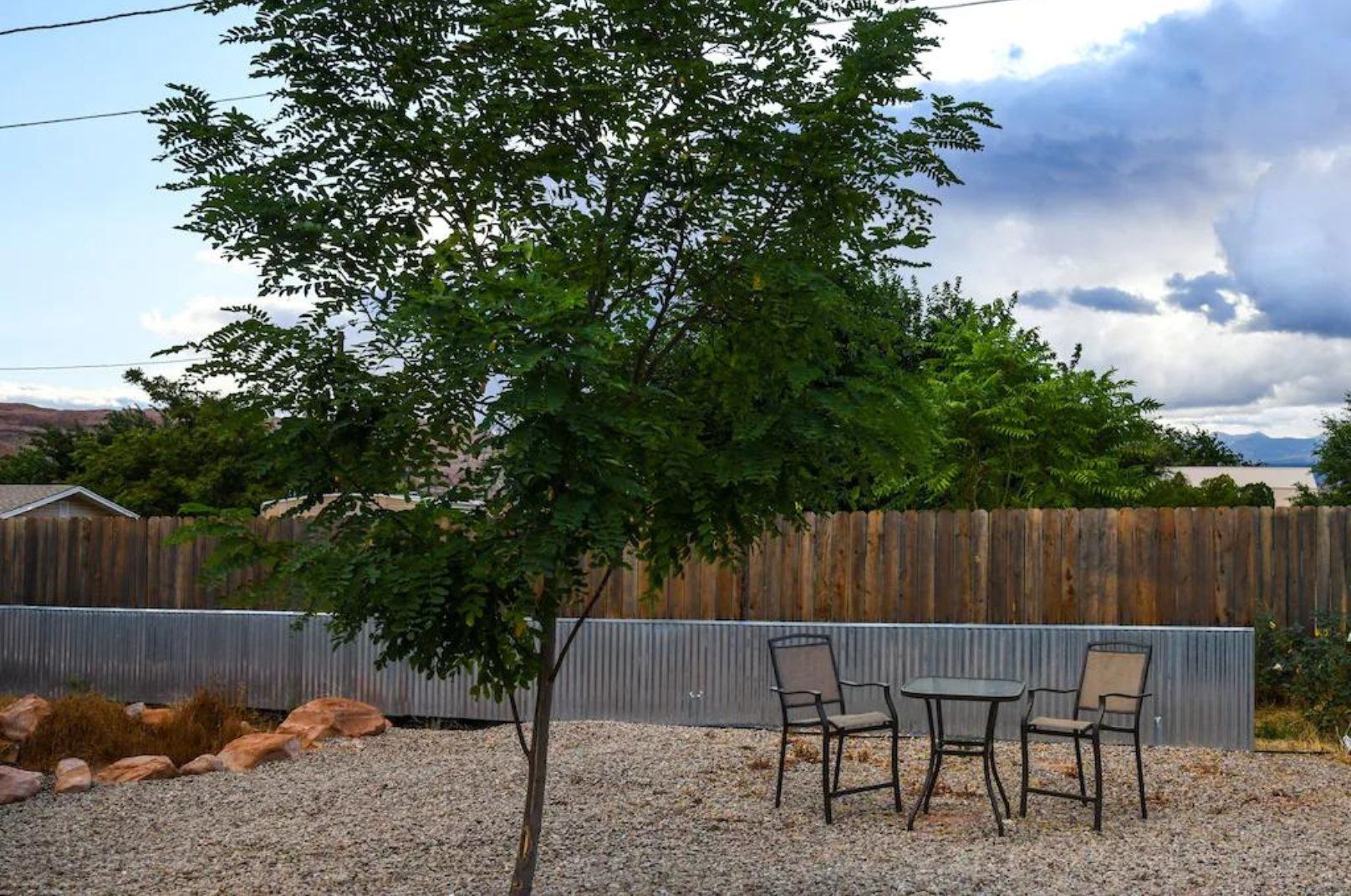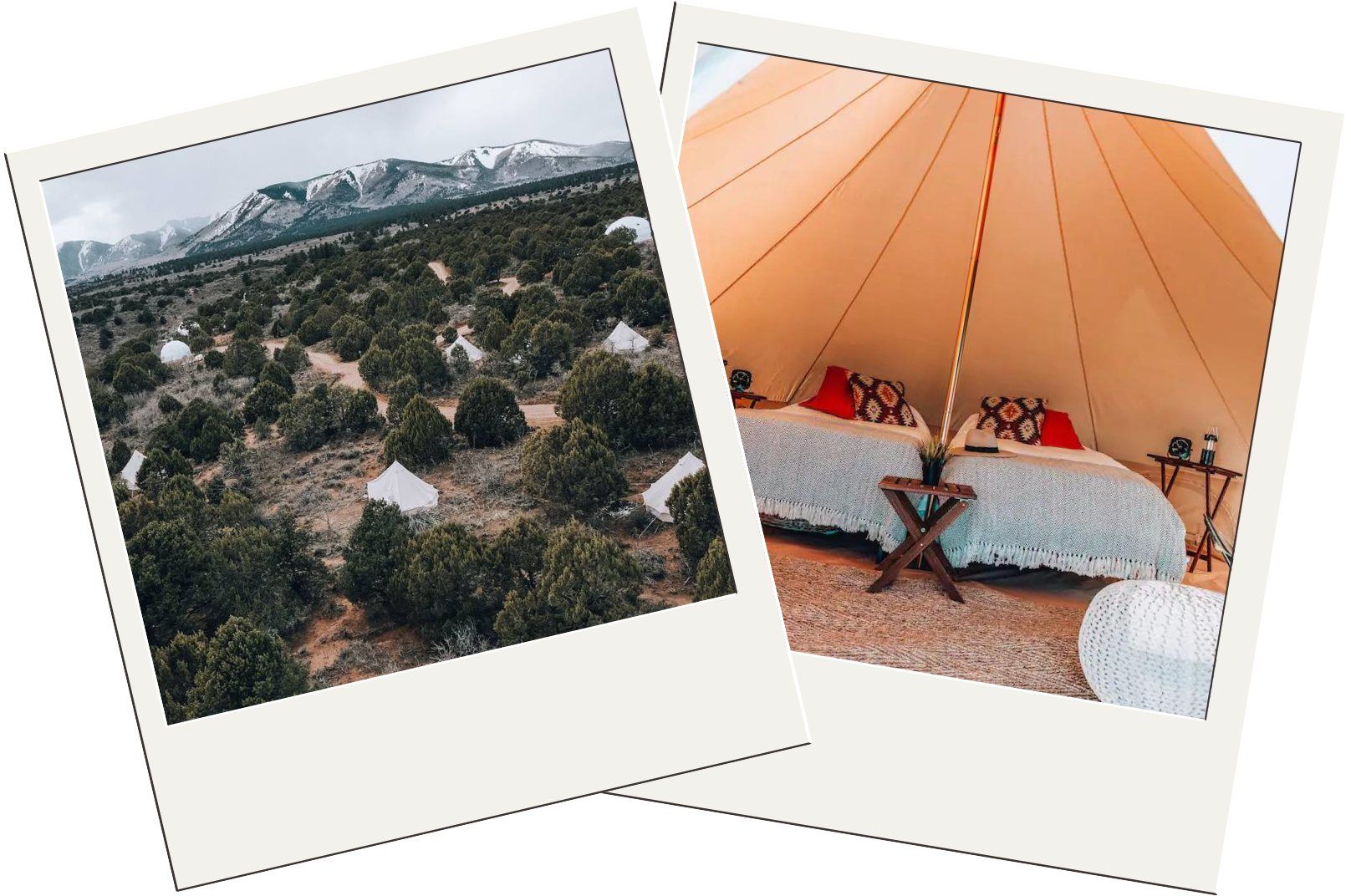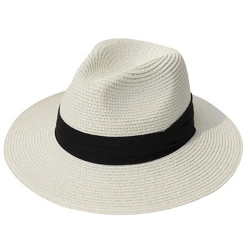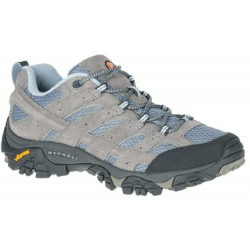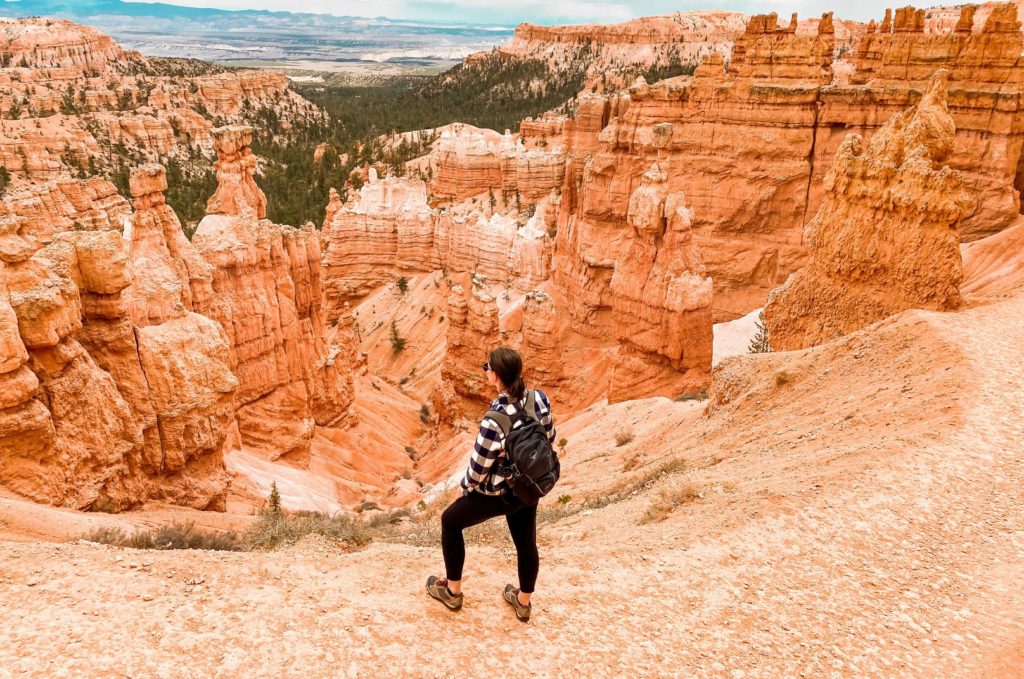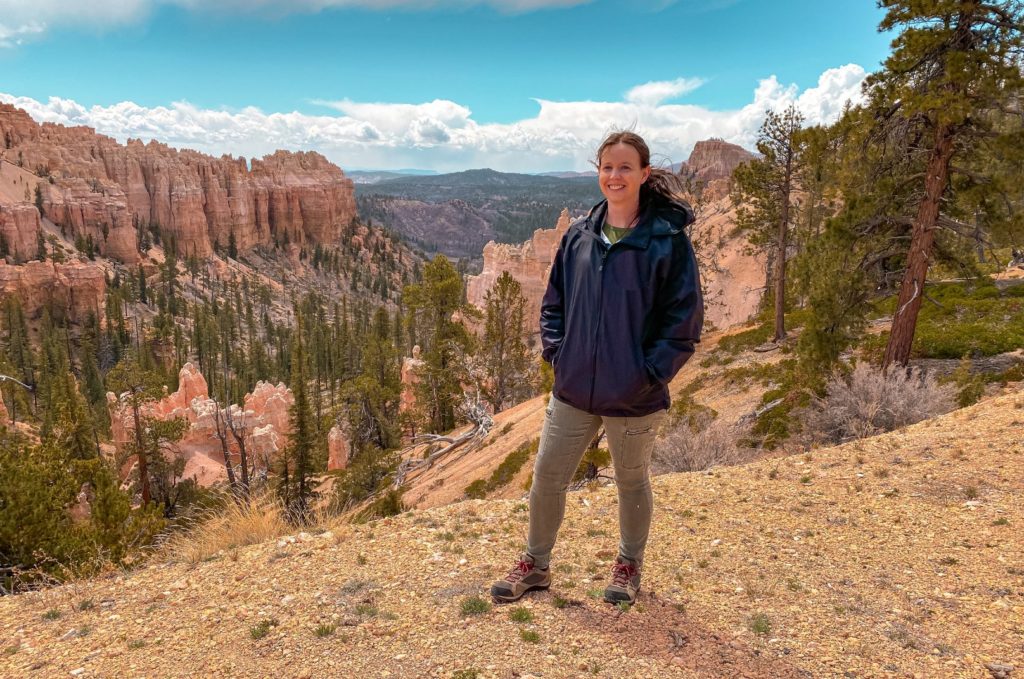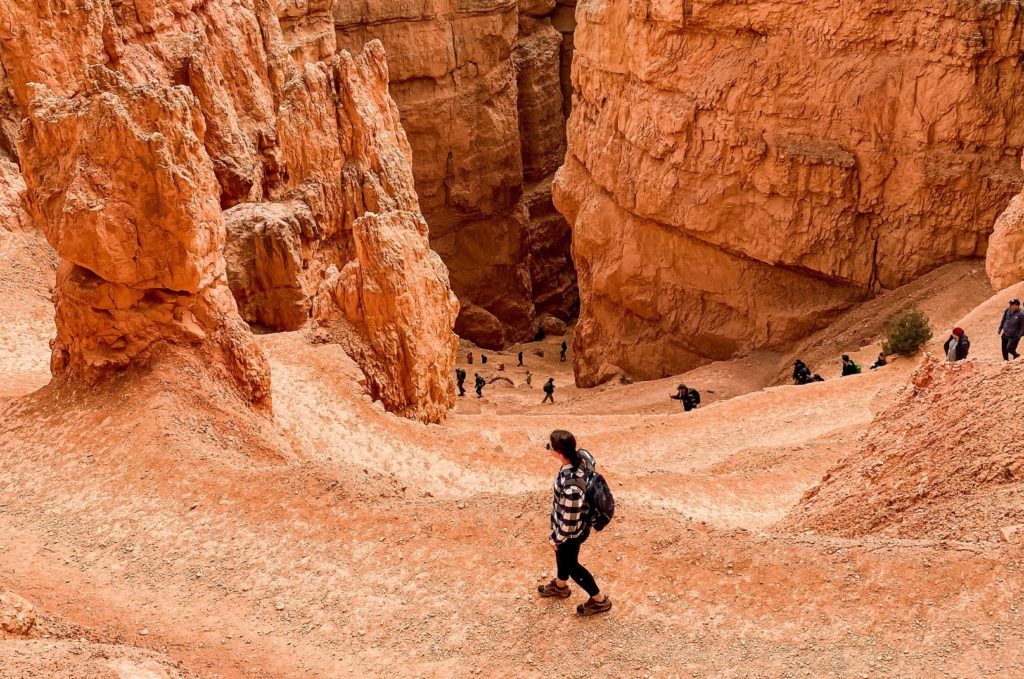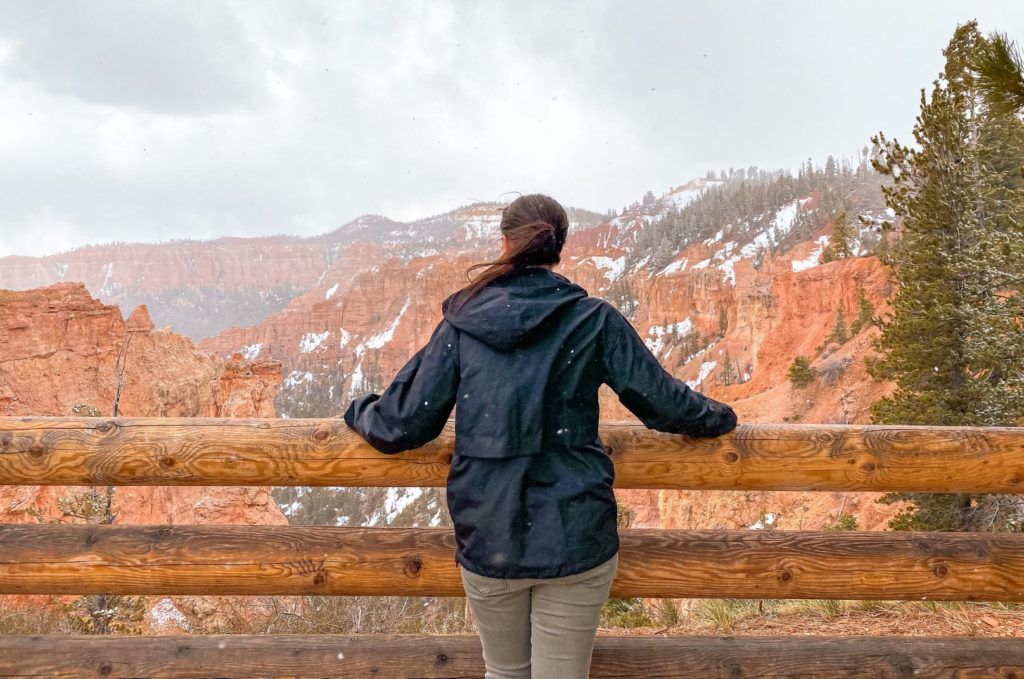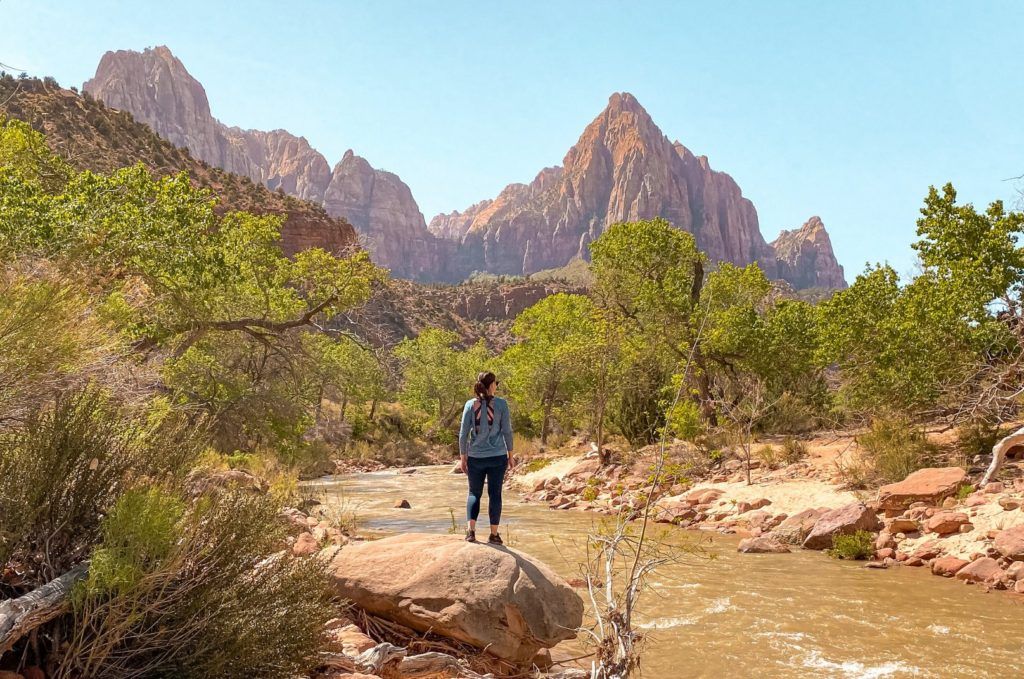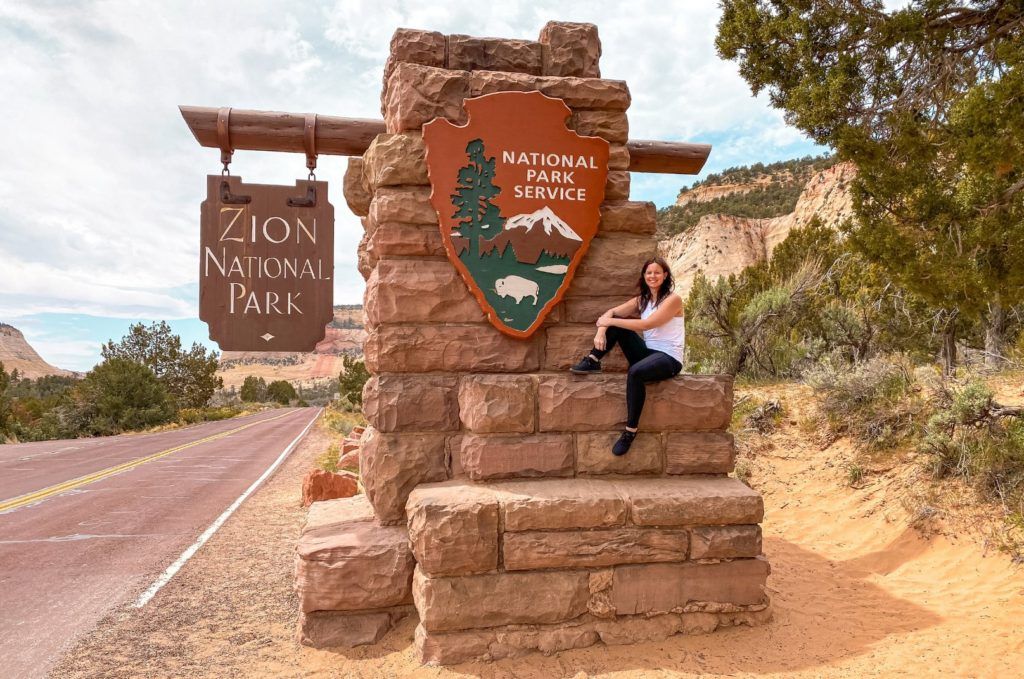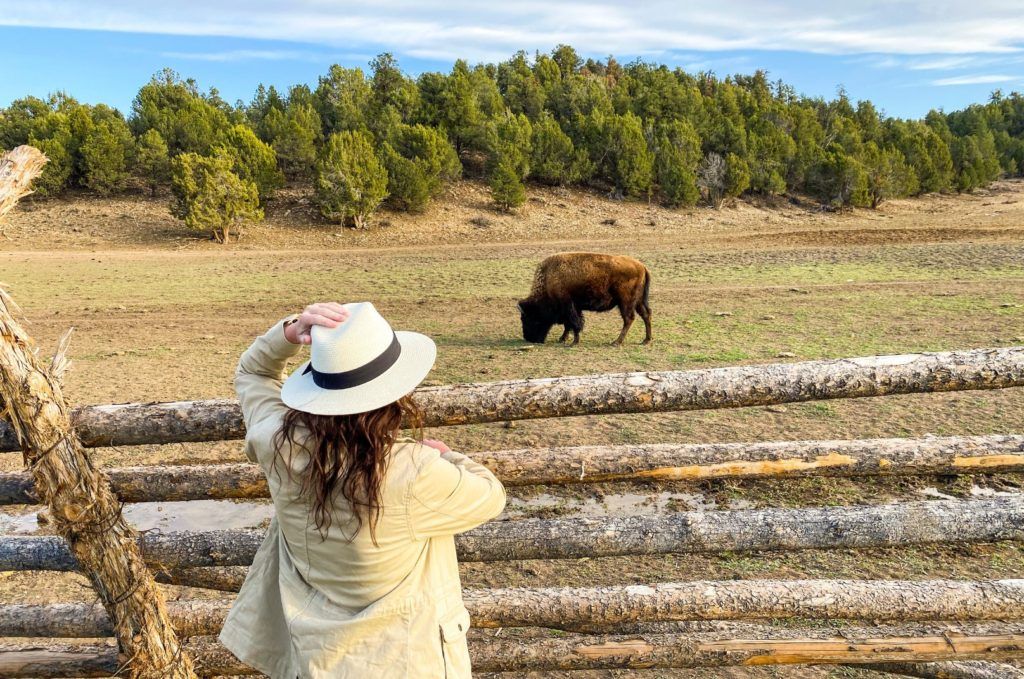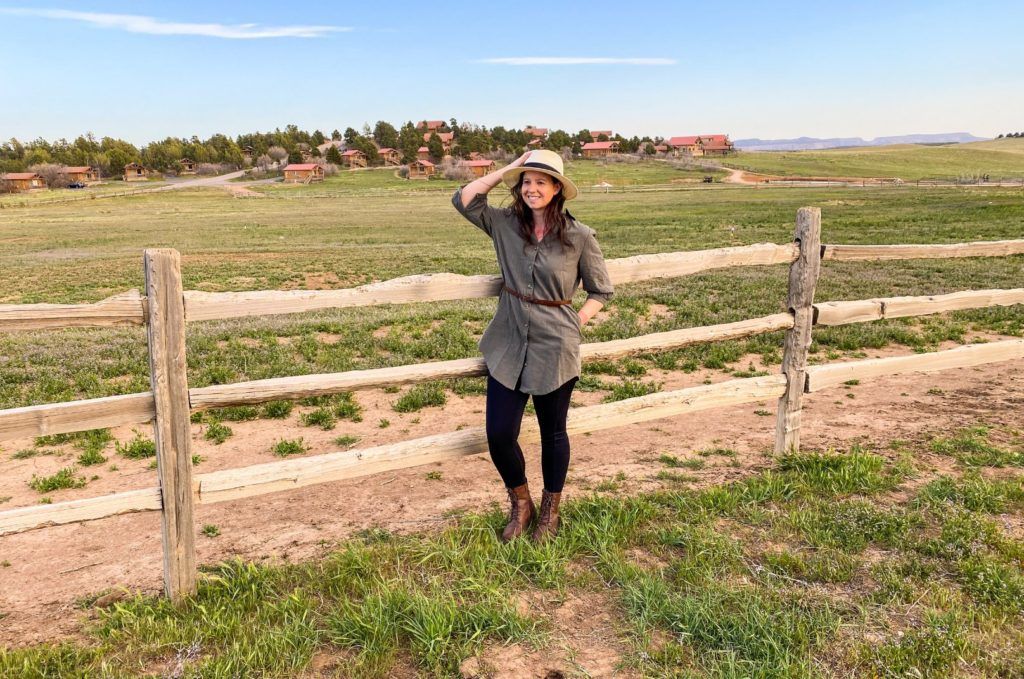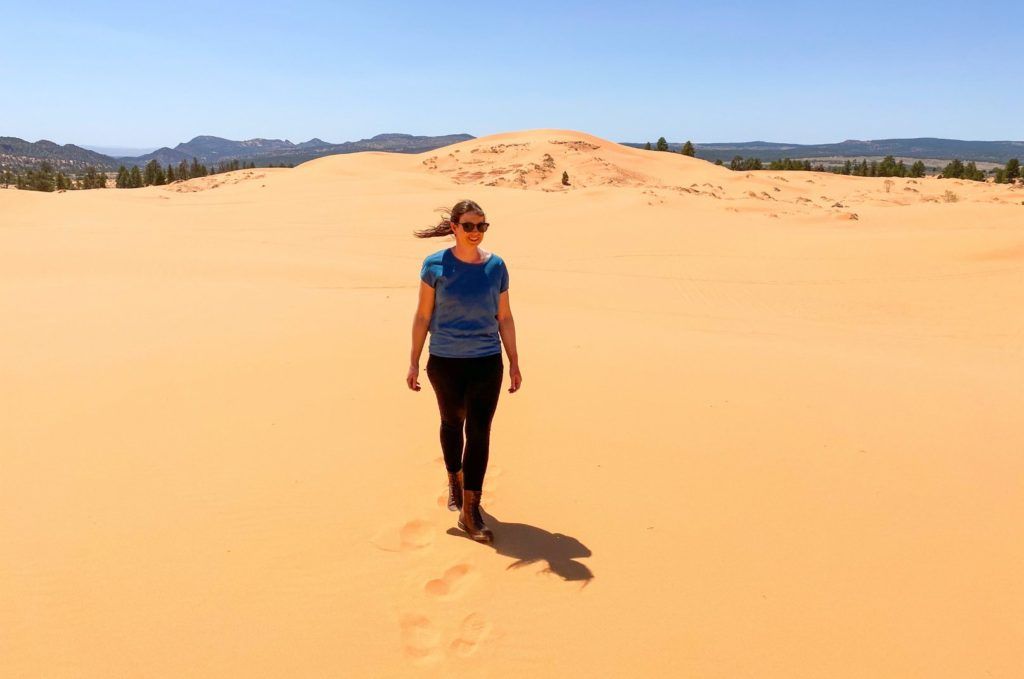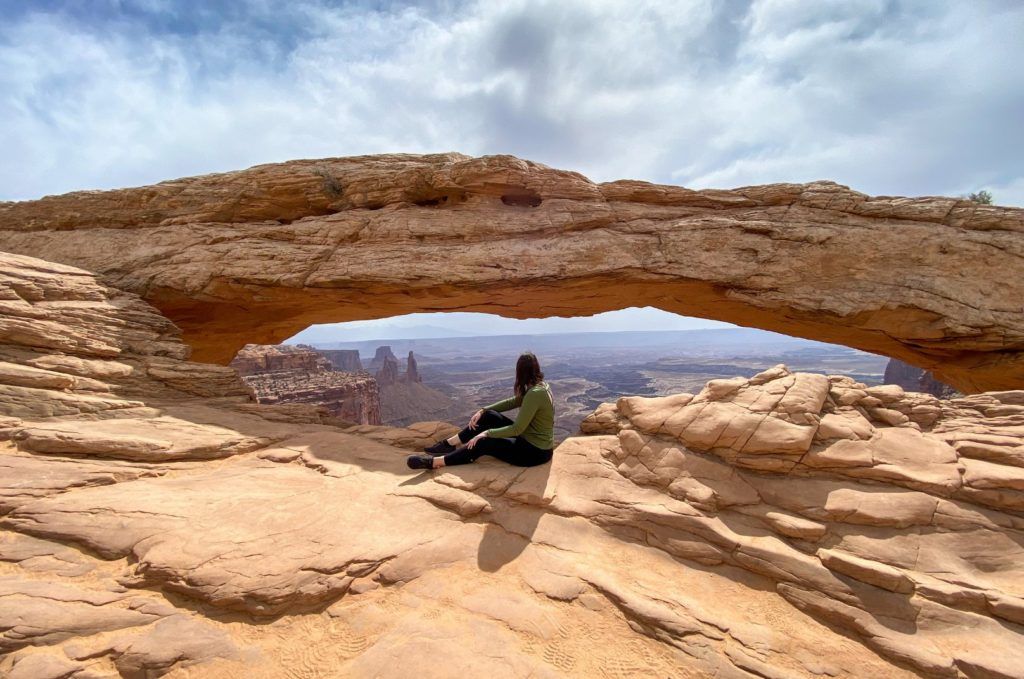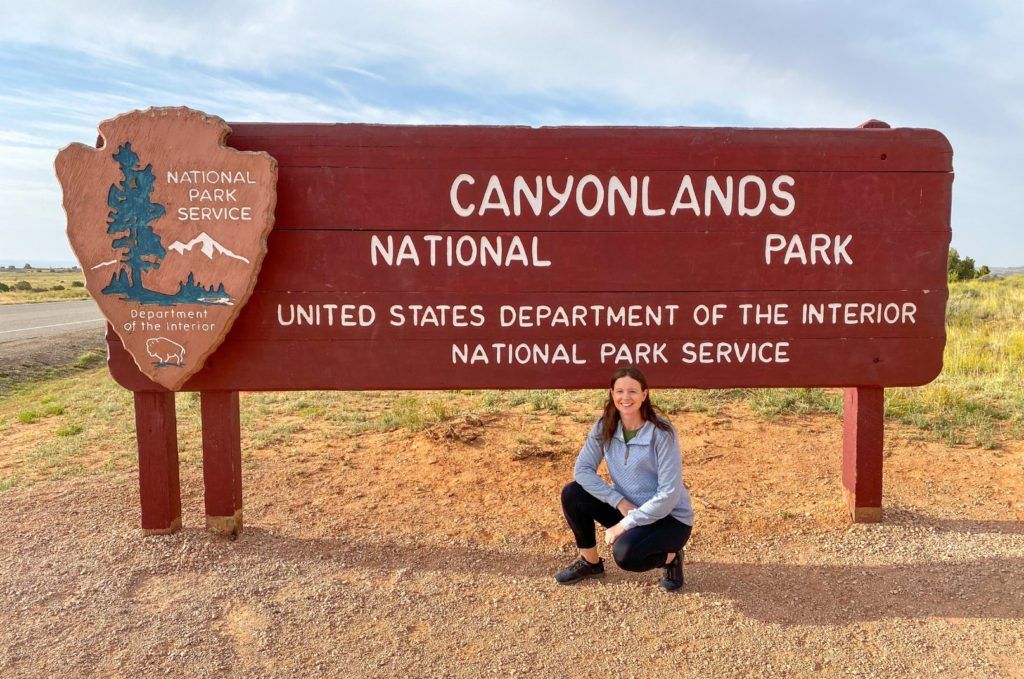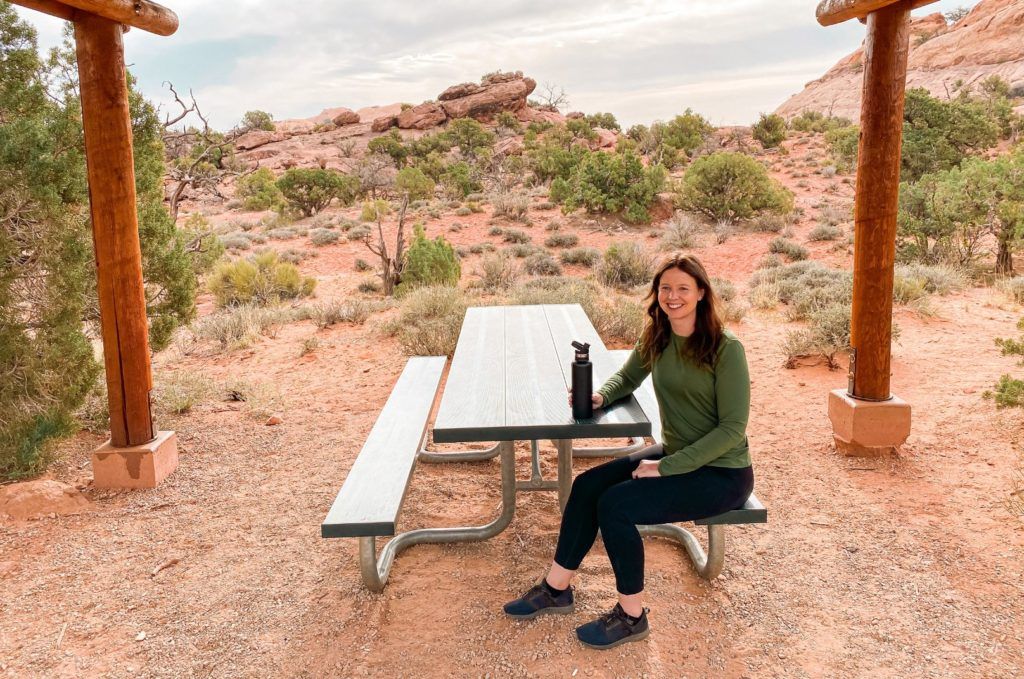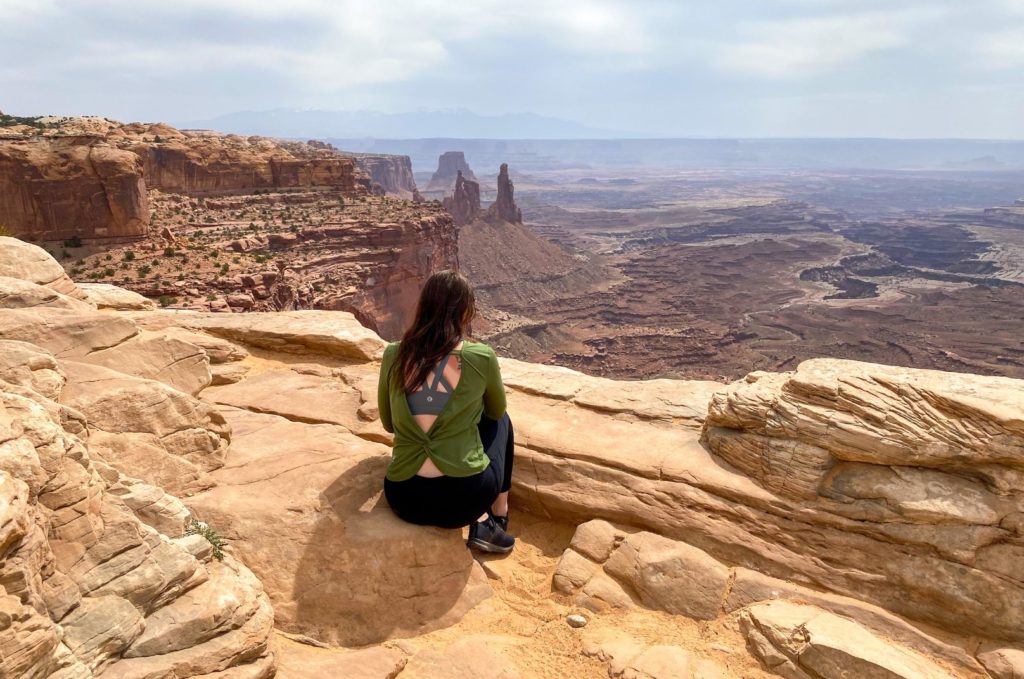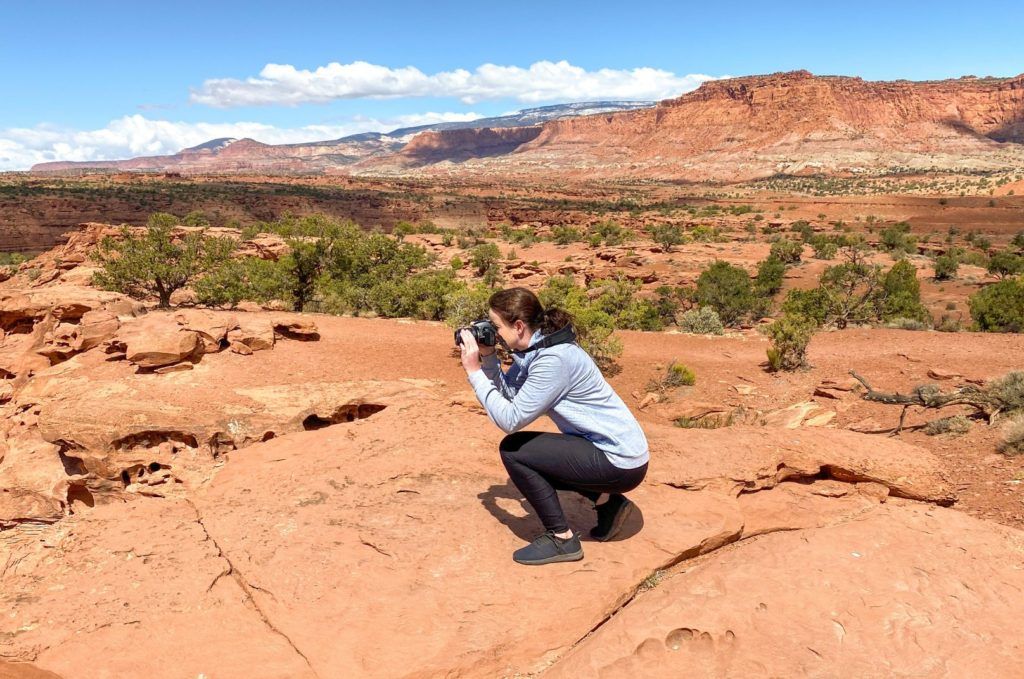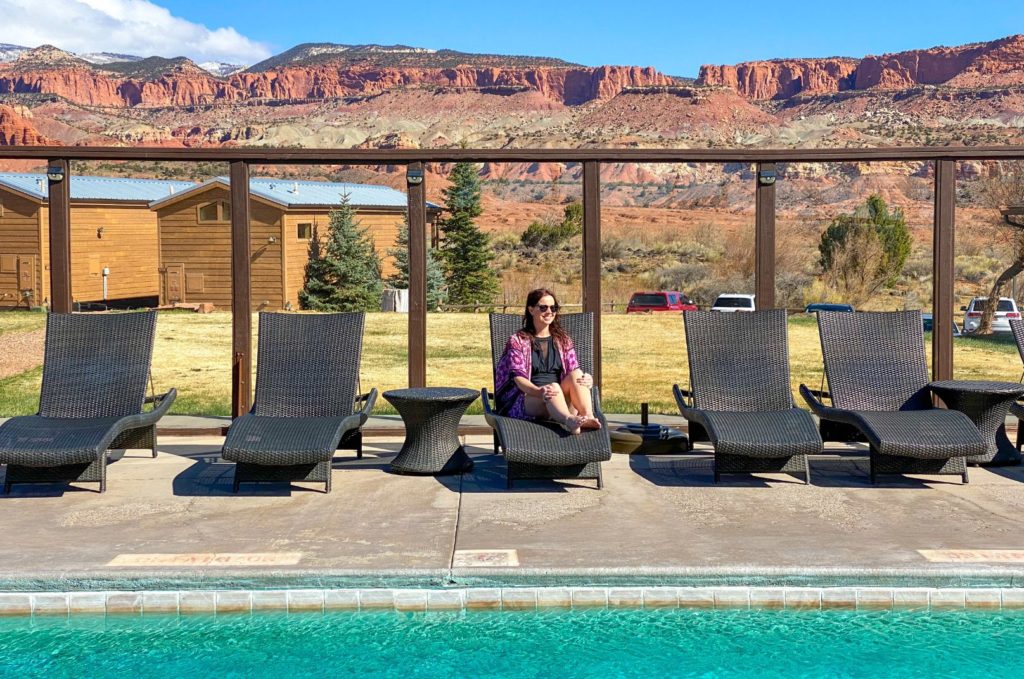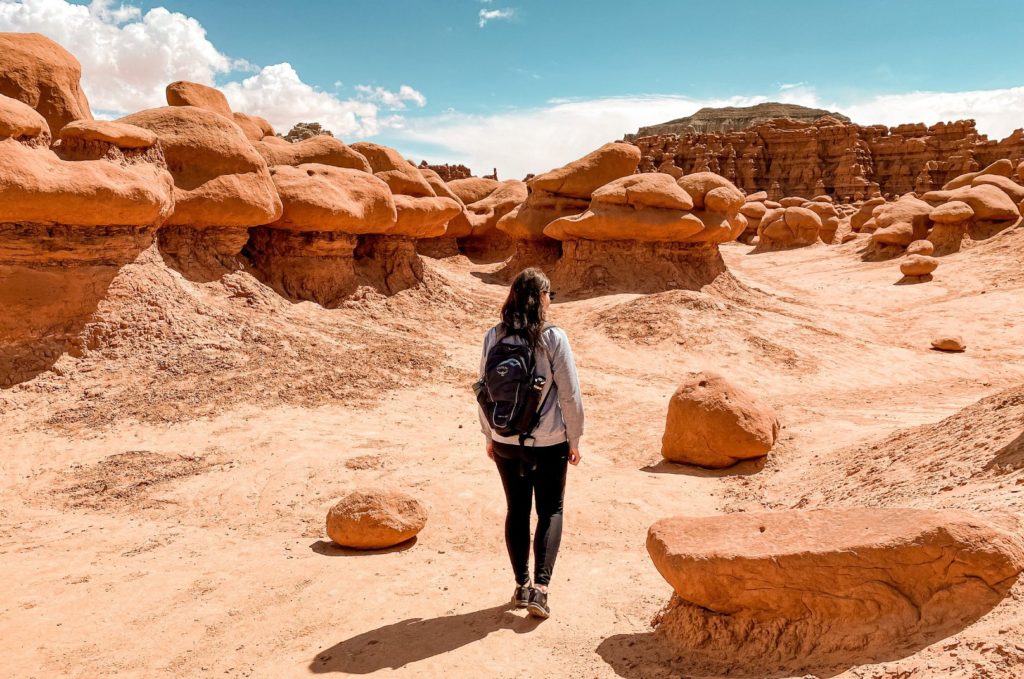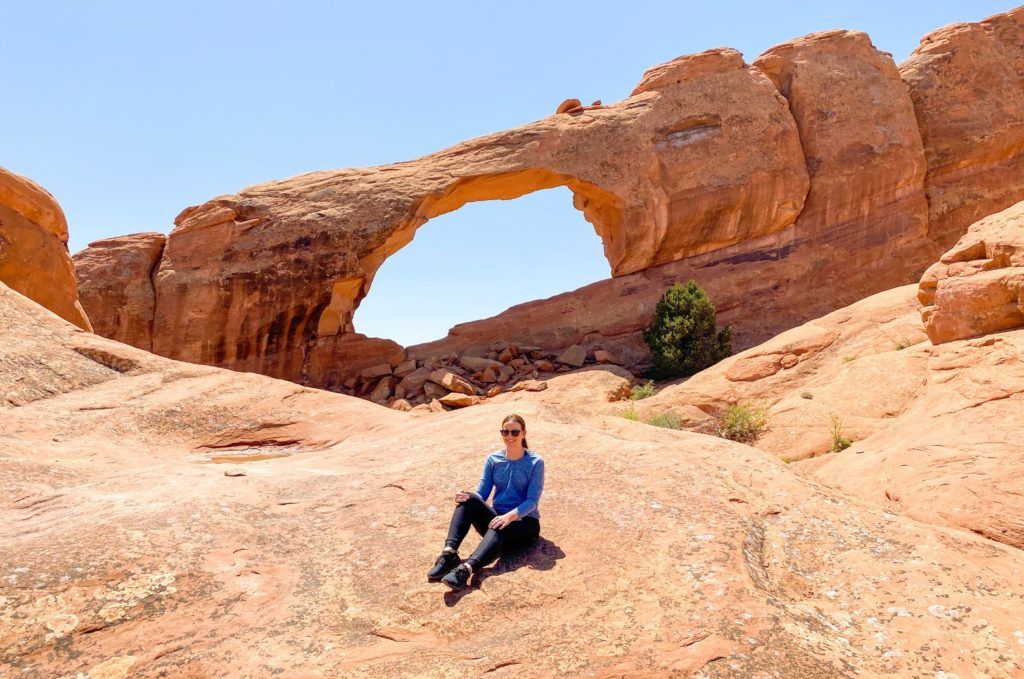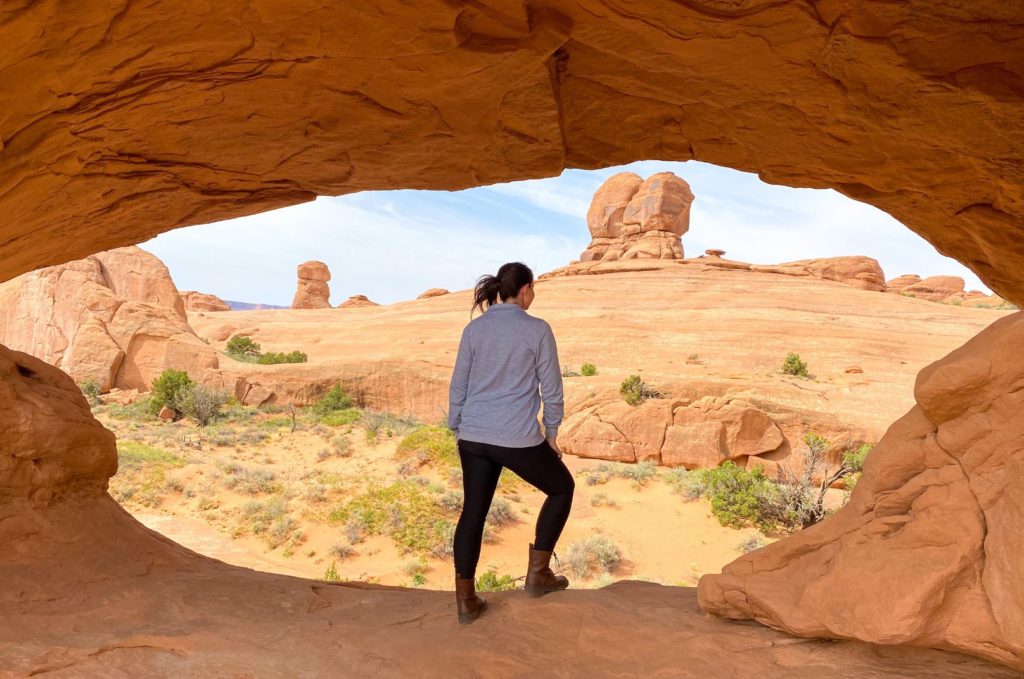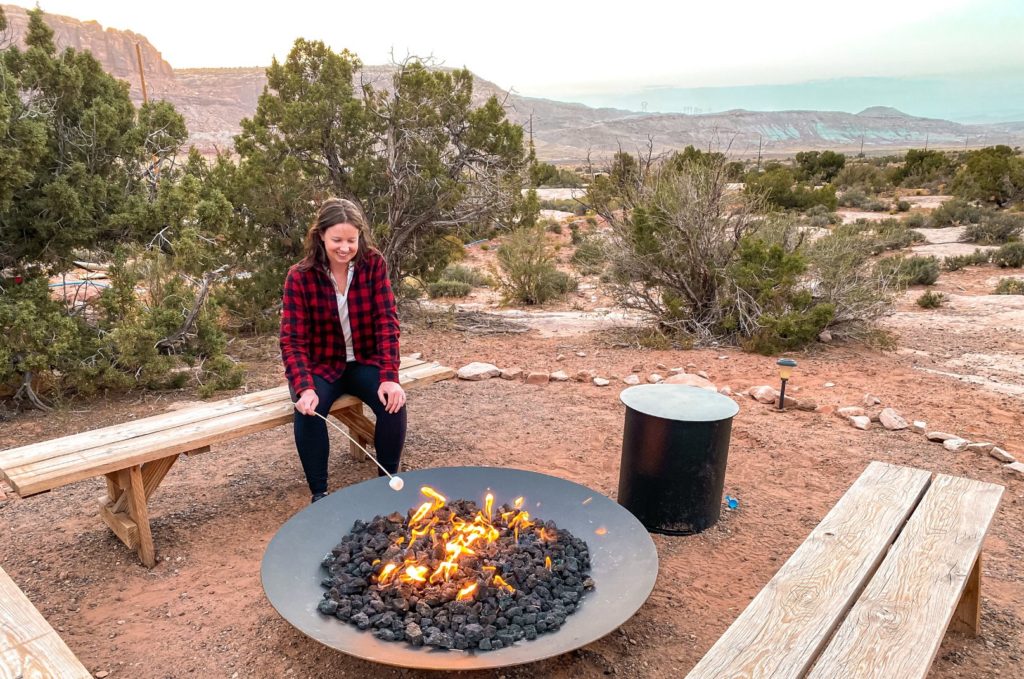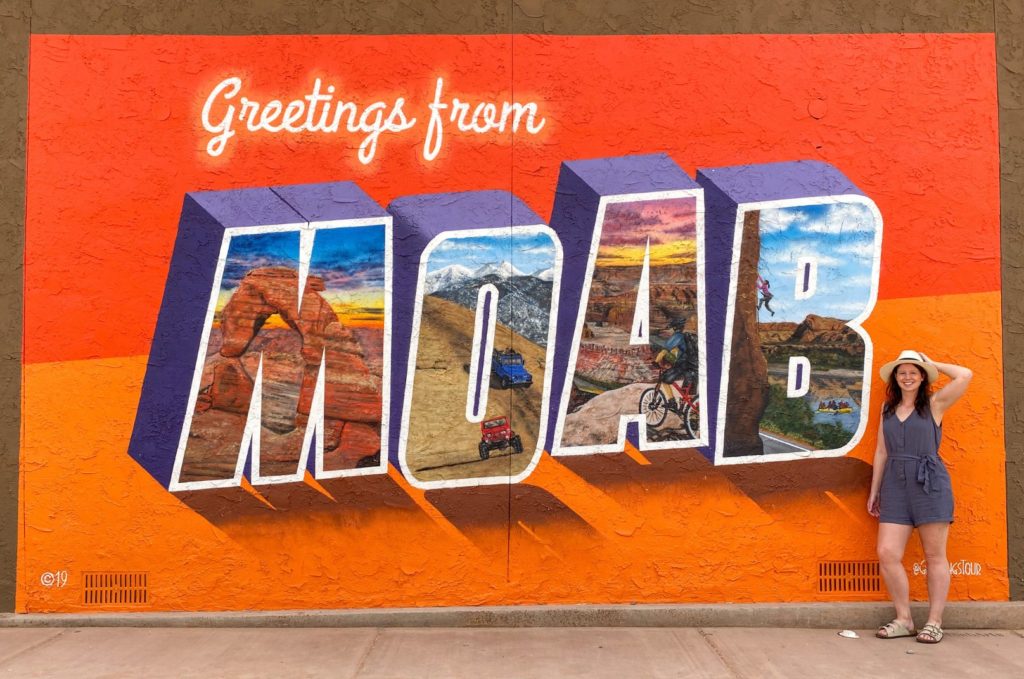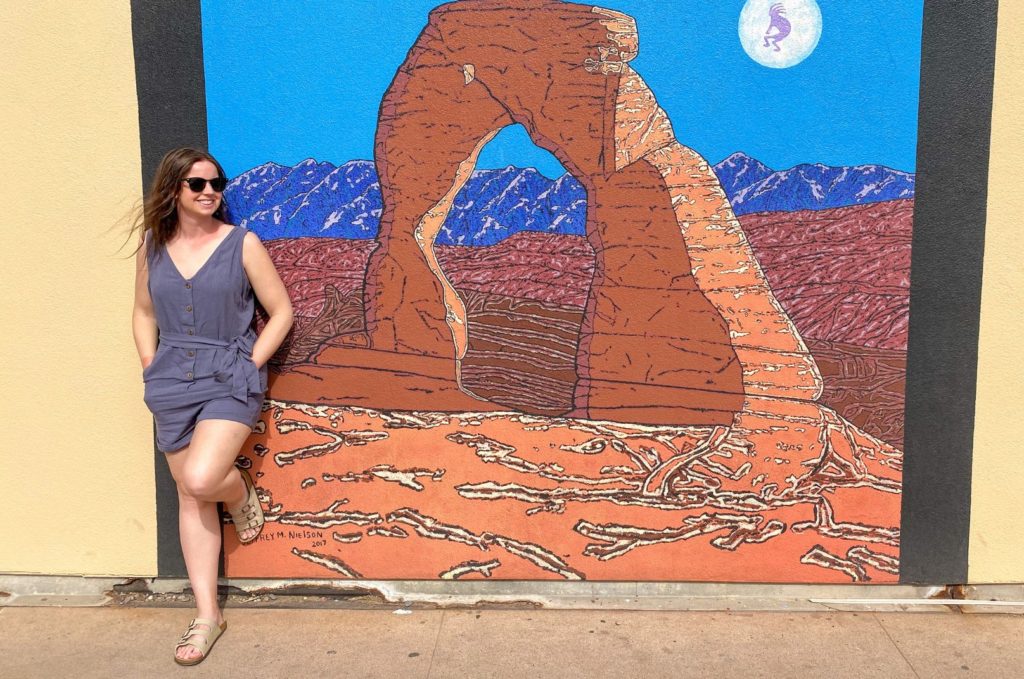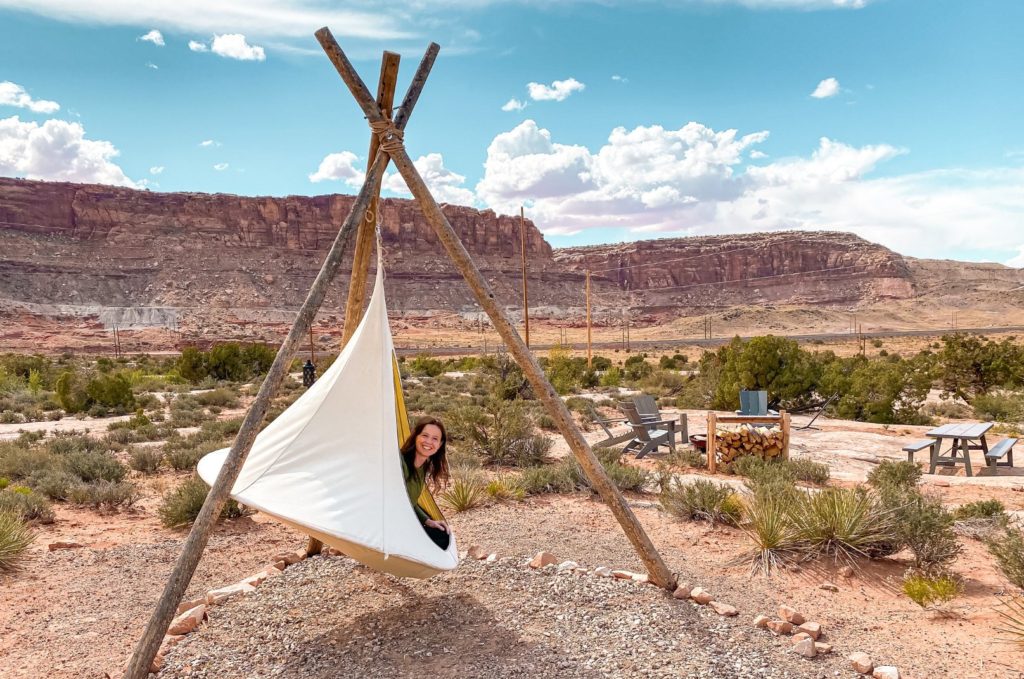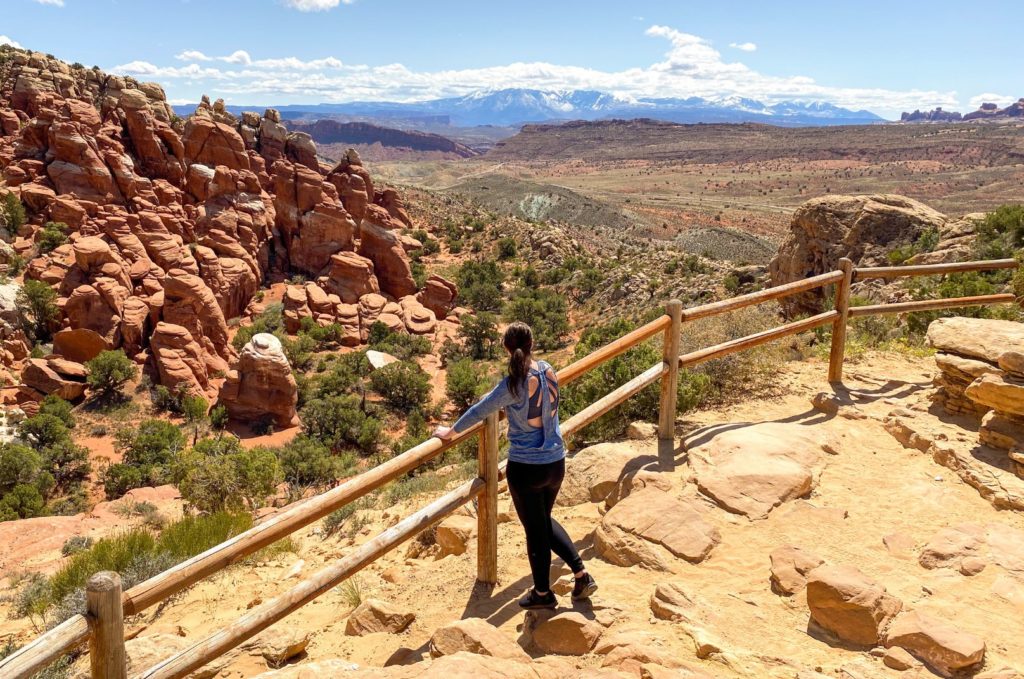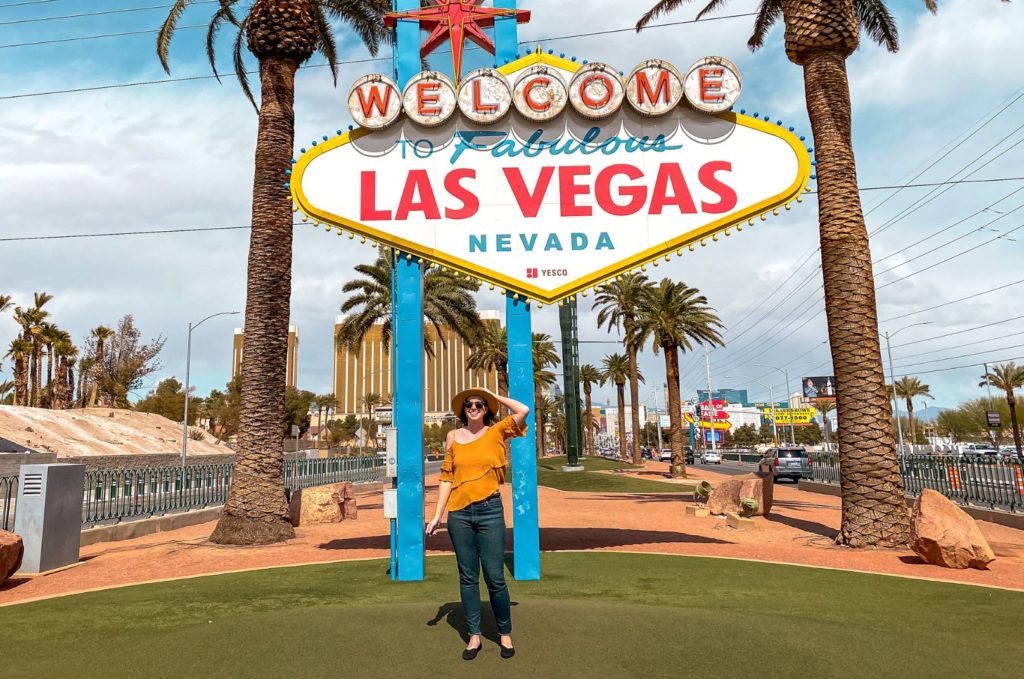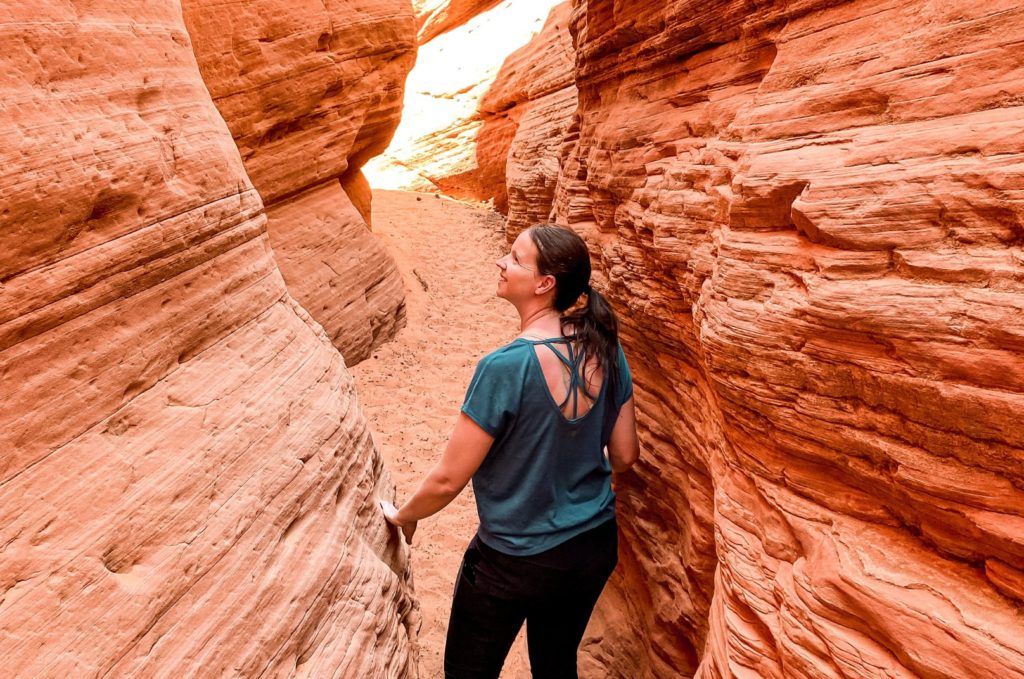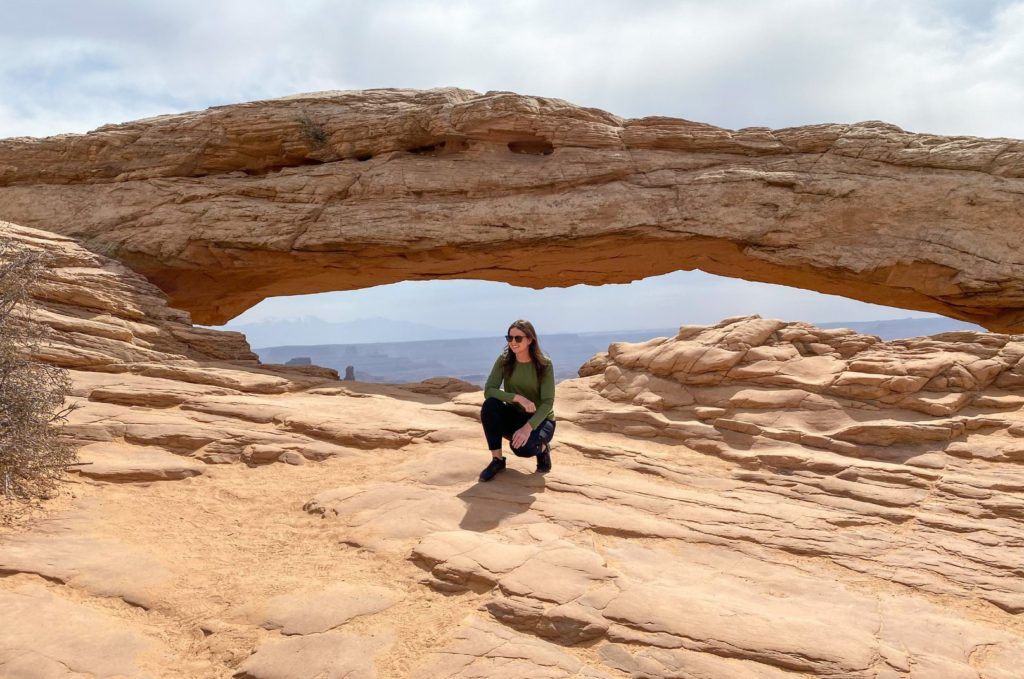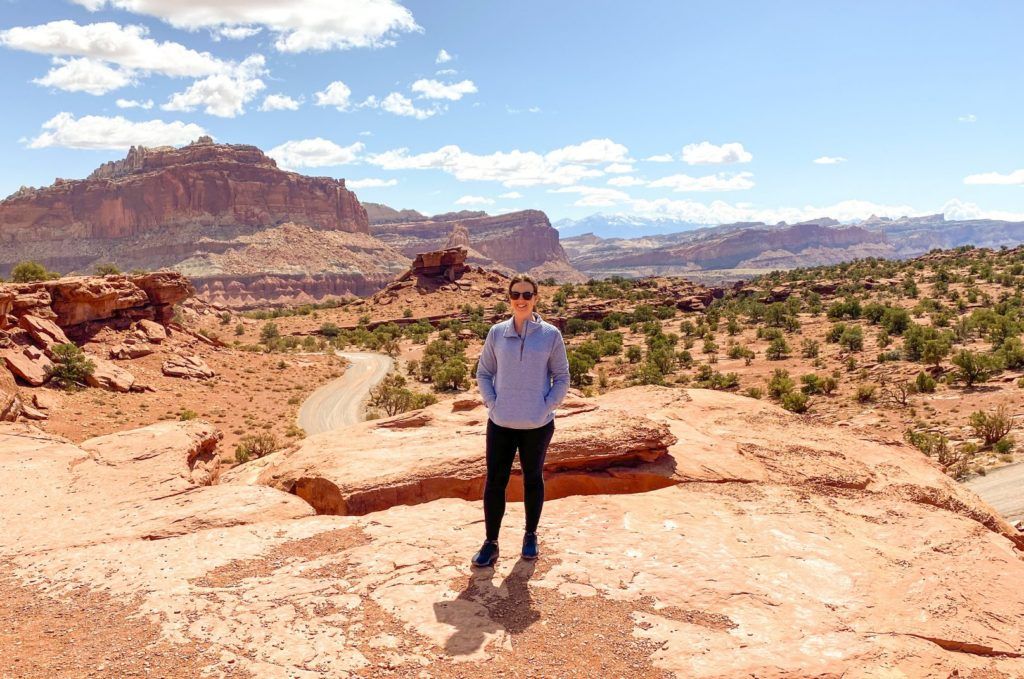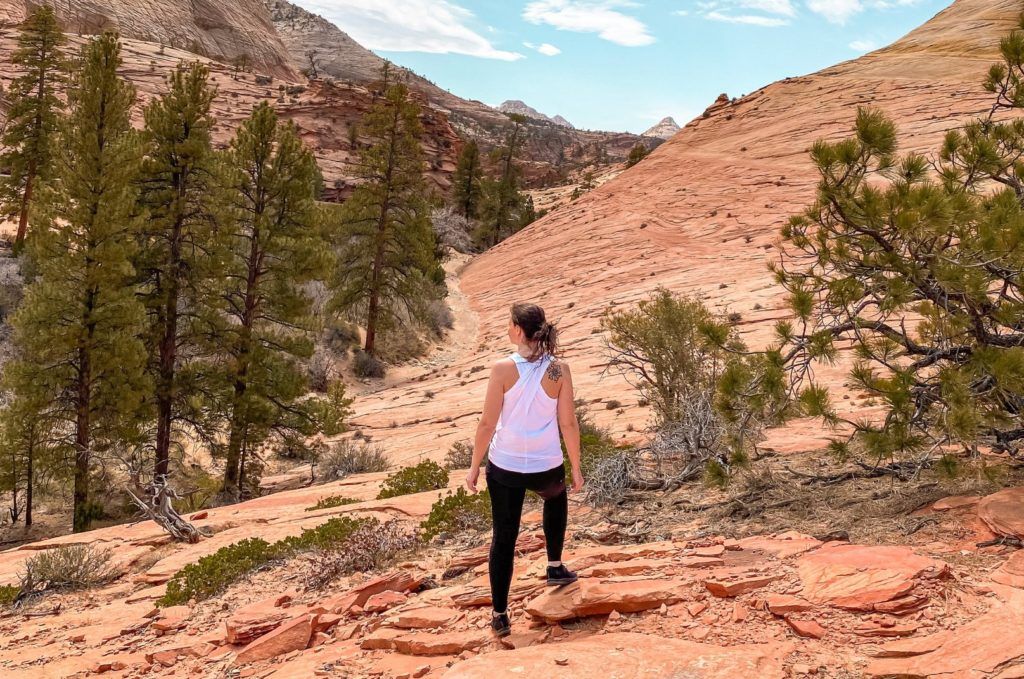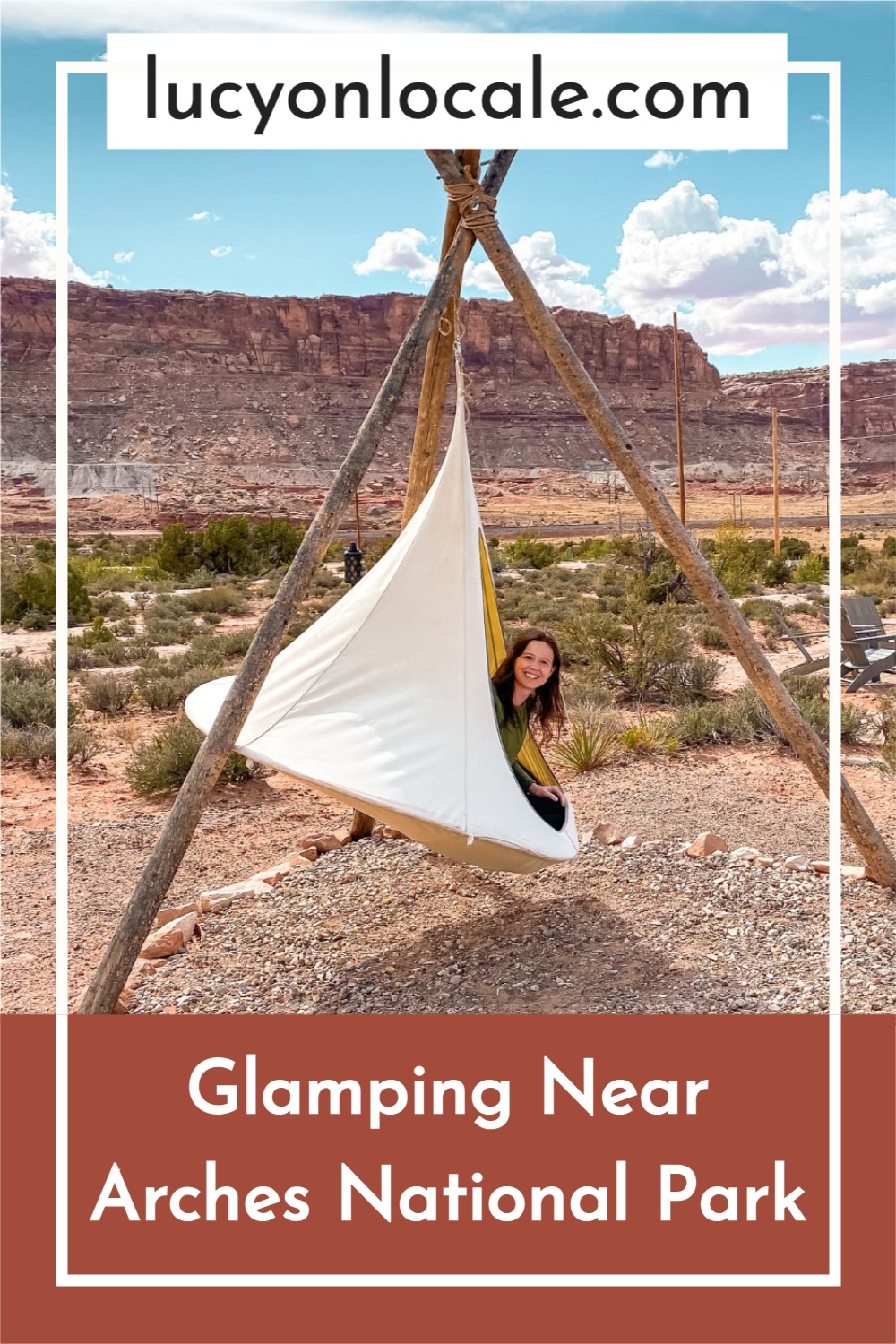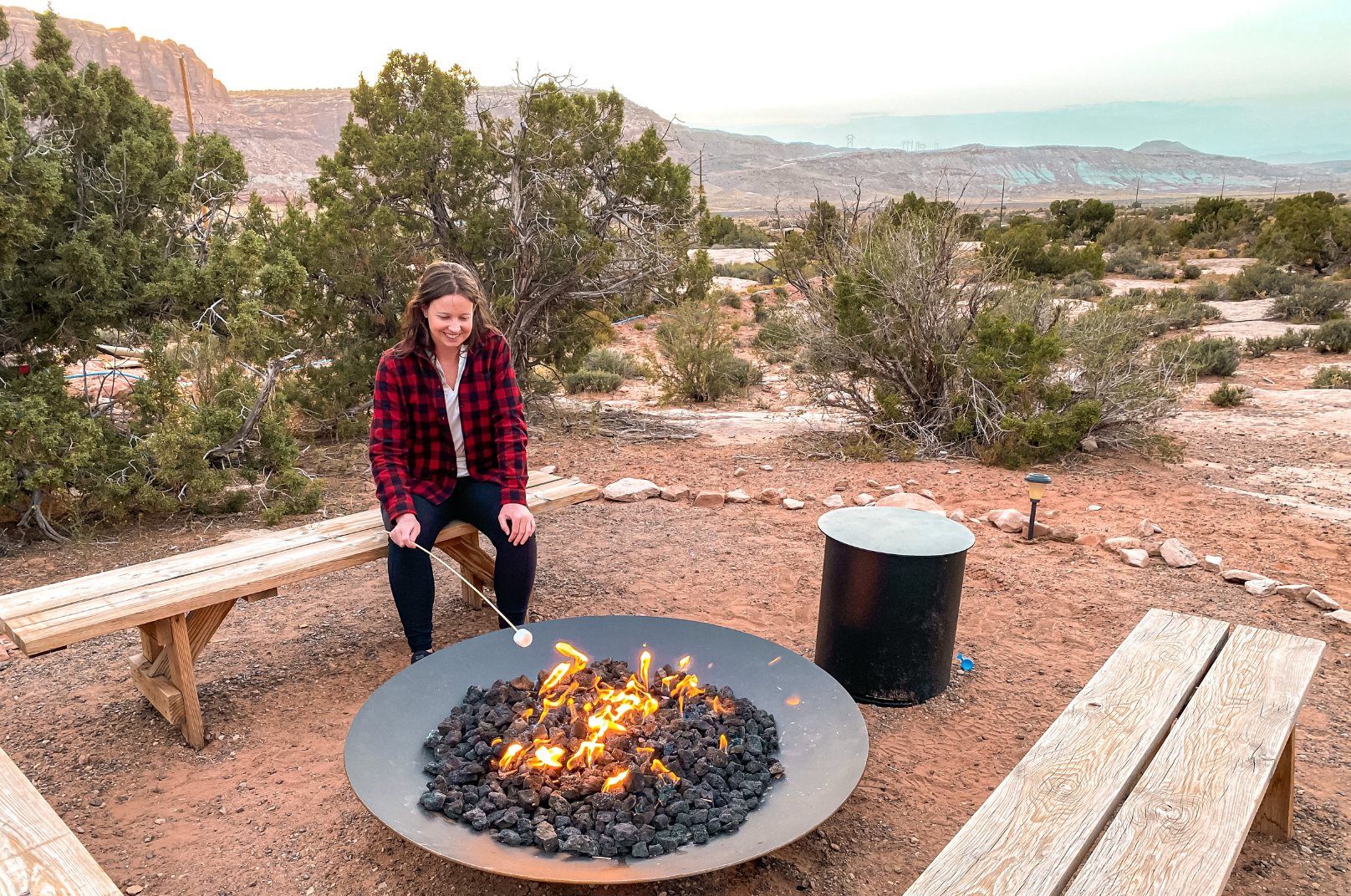
Arches is one of Utah’s “Mighty Five” national parks, along with Bryce Canyon, Capitol Reef, Zion, and Canyonlands. So I’ve rounded up the top glamping near Arches National Park.
Tips for Visiting Popular National Parks
I highly recommend visiting Arches as part of a Mighty Five road trip, and you can also check out the best hotels and Airbnbs near Arches National Park.
Here’s where to go glamping near Arches National Park!

Under Canvas Moab
I’ve stayed at several Under Canvas sites, and they are the epitome of luxury. Your tent will have an incredibly comfortable bed, stunning views of the national park, and all the amenities of home (minus internet). Plus, there are complimentary smores, on-site activities, and you’ll be ideally located for exploring Arches and Canyonlands.

Crooked Bindi Ranch
This unique glamping experience is on 80 acres of private and secluded land. You can choose from two luxury tents, each furnished with hotel-quality beds and a private bathroom built into the red rock landscape with a hot shower and flush toilet.

Base Camp
You can “escape it all” at this desert retreat. This one-of-a-kind adobe-style home has a resident tortoise, kayaks, wildlife viewing, and a front porch that you’ll never want to leave. You’ll also be a short walk from the river, a beach, and incredible hiking trails.

Glamping Canyonlands
Glamping Canyonlands
If you want a sustainable and unique off-grid camping experience, this is the glamping site for you. Your tent will have a plush bed, seating area, private deck with lounge chairs, private fire pits, grills, picnic tables, and gorgeous views of the La Sal Mountains.

Tiny House
Get ready to fall in love with this RV-style tiny home that can still sleep up to ten people. This home is close to Moab and Arches National Park, and you’ll love the outdoor seating and grill.

Wander Camp Canyonlands
Wander Camp Canyonlands
Wander Camp’s tepee-style tents are perfect for stargazing, getting off the grid, and camping in luxury. This glamping site is just a short drive from the park, and rustic, camp-style American dishes (cooked over an open flame grill) are served on-site.

Shop My National Park Essentials

What are your favorite places for glamping near Arches National Park? Share with us in the comments!

Plan The Rest Of Your Trip

Recommended Tours in Arches National Park

Frequently Asked Questions
Where do people stay when visiting Arches National Park?
The Best Hotels Near Arches National Park:
Under Canvas Moab
Hyatt Place Moab
Moab Springs Ranch
Hoodoo Moab, Curio Collection by Hilton
Wingate By Wyndham Moab
Sorrel River Ranch Resort
Best Western Plus Canyonlands Inn
Fairfield Inn & Suites by Marriott Moab
What town to stay for Arches National Park?
Moab, Utah, is the closest town to Arches National Park.
The Best Hotels Near Arches National Park:
Under Canvas Moab
Hyatt Place Moab
Moab Springs Ranch
Hoodoo Moab, Curio Collection by Hilton
Wingate By Wyndham Moab
Sorrel River Ranch Resort
Best Western Plus Canyonlands Inn
Fairfield Inn & Suites by Marriott Moab
What is the closest city to Arches National Park?
Moab, Utah, is the closest town to Arches National Park.
The Best Hotels Near Arches National Park:
Under Canvas Moab
Hyatt Place Moab
Moab Springs Ranch
Hoodoo Moab, Curio Collection by Hilton
Wingate By Wyndham Moab
Sorrel River Ranch Resort
Best Western Plus Canyonlands Inn
Fairfield Inn & Suites by Marriott Moab
What is the best time of year to go to Arches National Park?
Arches National Park is open 24 hours a day, every day of the year. But in the winter, some facilities are closed or operate on reduced hours.
June to August is the peak travel season, so be prepared for limited parking and crowds. You can avoid some of the other visitors by going on weekdays and arriving early in the morning. Daytime temperatures can get up to 110 degrees, so plan on hiking in the mornings and evenings. Book your accommodation and time entry as far in advance as possible, and rangers lead free guided evening walks in the summer
The rainy season is in late summer when frequent afternoon thunderstorms can bring heavy rain, flash flooding, or lightning. So you’ll need to monitor the weather continuously and don’t start a hike if storm warnings are in effect.
September and October are cooler months, with daytime temperatures in the mid-80s and 70s and lows in the 50s and 40s at night. There will be fewer tourists than in the summer, but you should still be prepared for crowds, especially on the weekends.
Winter is the off-season when you can have the park practically to yourself. November to March has daytime temperatures in the 30s – 50s, so it will be cold, but you won’t have to compete for parking or spots at the famous viewpoints. No ranger programs are offered in winter, though, and some roads and trails may close because of snow or ice.
April and May are beautiful months to visit Arches because the wildflowers will be blooming. Daytime temperatures will be in the low 80s and 70s, and rangers offer free, daily guided 1-mile walks along easy trails. Spring is only slightly less popular than the summer months, so there will be crowds and lines to get into the park.
How many days do you need in Arches National Park?
1-2 Days.
If you’re only visiting Arches National Park for a day, arrive as early as possible. Start with the Delicate Arch hike (3-mile round trip, moderate, walking along rock ledges, plan on this taking at least three hours).
Next, stop at the Salt Valley and Fiery Furnace Viewpoints. Then hike out and back to Sand Dune Arch. If the Delicate Arch hike is too strenuous for you, walk to the Upper Delicate Arch Viewpoint (200 feet, easy, 15 minutes round trip), then visit the Salt Valley and Fiery Furnace Viewpoints, then hike out and back to Sand Dune Arch and Broken Arch (1.5 miles round trip, easy-moderate, about an hour).
Have lunch near the Devils Garden Campground, then hike behind the Amphitheatre to see Skyline Arch. Most people view Skyline Arch from the main road, but the view is better from the amphitheater side, and you can usually have the arch to yourself.
Spend the next three(ish) hours hiking as much of the Devils Garden Trail as possible. I recommend getting at least as far as Navajo Arch, Partition Arch, and Landscape Arch. Pace yourself, and don’t hike further out than you can walk back.
Next, drive back down the main park road and stop at Panorama Point and Garden of Eden. Then explore Double Arch and hike the North Window/South Window/Turret Arch loop.
On your way out of the park, end your day by seeing Balanced Rock, the Petrified Dunes Viewpoint, Courthouse Towers Viewpoint, and La Sal Mountains Viewpoint.
I highly recommend spending a second day in Arches National Park if possible. This will allow your first day to go at a more leisurely pace. If you have a second day, hike the Devils Garden Trail on your second morning instead of your first day.
Then in the afternoon, do a guided 4×4 tour of the backcountry. More than 1.5 million people visit Arches National Park every year, but only about 15,000 venture into the backcountry. So a 4×4 ride is a way to escape the crowds and explore a part of the park that few people ever visit.
Does Arches National Park have cabins?
Arches has many hotel, Airbnb, and glamping options in the nearby town of Moab.
For camping, I highly recommend staying at the Devils Garden Campground inside the park. This campground requires reservations from March to October, and these sites book up FAST, so reserve yours as early as possible. Between November and February, campsites are first-come, first-served.
If you’re bringing an RV or motorhome, opt for the Sun Outdoors Arches Gateway park or the Sun Outdoors Canyonlands Gateway park.
Do you need a reservation to get into Arches National Park?
Arches National Park requires a time entry reservation from April – October, so plan ahead and book your time slot as far in advance as possible because the early entry times go FAST.
Can you stay overnight in Arches?
Arches National Park is open 24 hours a day, every day of the year.
Know Before You Go:
 The park roads are narrow and winding, so watch for bicyclists and pedestrians, and only stop at designated pull-offs and viewpoints.
The park roads are narrow and winding, so watch for bicyclists and pedestrians, and only stop at designated pull-offs and viewpoints. Stay on designated trails to preserve fragile biological soil crusts, protect plant and animal habitats, and reduce your risk of getting lost.
Stay on designated trails to preserve fragile biological soil crusts, protect plant and animal habitats, and reduce your risk of getting lost. You can ride bikes on park roads, but not on trails or in the backcountry.
You can ride bikes on park roads, but not on trails or in the backcountry. I highly recommend having a walking stick on trails. Most of the park’s trails are sandstone, which crumbles easily and is more difficult to climb down than up.
I highly recommend having a walking stick on trails. Most of the park’s trails are sandstone, which crumbles easily and is more difficult to climb down than up. There is no food in the park, so pack your lunch and have snacks with you.
There is no food in the park, so pack your lunch and have snacks with you. The sun is intense, and shade is rare. So always have sun protection, sunglasses, and more water than you think you’ll need. In the summer months, avoid hiking in the middle of the day.
The sun is intense, and shade is rare. So always have sun protection, sunglasses, and more water than you think you’ll need. In the summer months, avoid hiking in the middle of the day. There is limited cell service inside the park, so download or screenshot maps and trail guides before you arrive.
There is limited cell service inside the park, so download or screenshot maps and trail guides before you arrive. You cannot climb on any of the arches.
You cannot climb on any of the arches. Pets are only allowed on public roadways, in campgrounds, and in parking lots, and they must be on a leash no more than six feet long.
Pets are only allowed on public roadways, in campgrounds, and in parking lots, and they must be on a leash no more than six feet long. This park is at a high altitude (between 4000 and 5600 feet), so it’s easy to get “winded.” Take lots of breaks, sit down when you can, and always have plenty of water, sun protection, and snacks.
This park is at a high altitude (between 4000 and 5600 feet), so it’s easy to get “winded.” Take lots of breaks, sit down when you can, and always have plenty of water, sun protection, and snacks. There is no gas inside the park, so ensure you have a full tank before getting to the park entrance.
There is no gas inside the park, so ensure you have a full tank before getting to the park entrance. Using artificial light sources to illuminate the landscape for photography at night is not allowed.
Using artificial light sources to illuminate the landscape for photography at night is not allowed.

This article about glamping near Arches National Park is not a sponsored post, and the thoughts and opinions expressed in this post about glamping near Arches National Park are entirely my own. Some of the links in this post about the best glamping near Arches National Park are affiliate links, and, at no cost to you, I may earn a small commission.
 Destinations
Destinations Packing
Packing Travel Tips
Travel Tips
 Photography
Photography Points & Miles
Points & Miles Credit Cards
Credit Cards